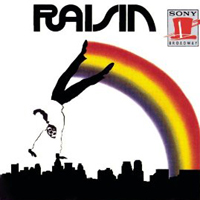 Original Broadway Cast, 1973 (Columbia/Sony)
Original Broadway Cast, 1973 (Columbia/Sony)  (3 / 5) Despite its healthy Broadway run and its Tony Award for Best Musical, Raisin is almost completely forgotten. Fortunately, the Robert Nemiroff-Charlotte Zaltzberg adaptation of Lorraine Hansberry’s A Raisin in the Sun, with a score by composer Judd Woldin and lyricist Robert Brittan, yielded a wonderful cast album. Stunning vocals tell the story: The matriarch (Virginia Capers) of the ghetto-bound, black Younger family wants to use her late husband’s insurance money to buy a nice house that’s up for sale in a white neighborhood, but her son Walter (Joe Morton) and daughter-in-law Ruth (Ernestine Jackson) have different ideas about how to use the money. There’s also fine work from Debbie Allen as Walter’s striving sister and Ralph Carter as Walter and Ruth’s son. The score is alternately soulful, driving, and tender. The pulsating prologue sets the tone, followed by “Man Say,” Morton’s explanation of the differences between men and women. Jackson shines in “Whose Little Angry Men” and “Sweet Time.” Other highlights are the lovely “Sidewalk Tree,” the biting “Not Anymore,” and the rousing gospel tune “He Come Down This Morning.” Capers’ 11-o’clock number, “Measure the Valleys,” is one of the most powerful theater songs of the period. — David Barbour
(3 / 5) Despite its healthy Broadway run and its Tony Award for Best Musical, Raisin is almost completely forgotten. Fortunately, the Robert Nemiroff-Charlotte Zaltzberg adaptation of Lorraine Hansberry’s A Raisin in the Sun, with a score by composer Judd Woldin and lyricist Robert Brittan, yielded a wonderful cast album. Stunning vocals tell the story: The matriarch (Virginia Capers) of the ghetto-bound, black Younger family wants to use her late husband’s insurance money to buy a nice house that’s up for sale in a white neighborhood, but her son Walter (Joe Morton) and daughter-in-law Ruth (Ernestine Jackson) have different ideas about how to use the money. There’s also fine work from Debbie Allen as Walter’s striving sister and Ralph Carter as Walter and Ruth’s son. The score is alternately soulful, driving, and tender. The pulsating prologue sets the tone, followed by “Man Say,” Morton’s explanation of the differences between men and women. Jackson shines in “Whose Little Angry Men” and “Sweet Time.” Other highlights are the lovely “Sidewalk Tree,” the biting “Not Anymore,” and the rousing gospel tune “He Come Down This Morning.” Capers’ 11-o’clock number, “Measure the Valleys,” is one of the most powerful theater songs of the period. — David Barbour
Category Archives: N-P
Putting It Together
 Off-Broadway Cast, 1993 (RCA)
Off-Broadway Cast, 1993 (RCA)  (2 / 5) There have been tons of Stephen Sondheim revues, but the big attraction of Putting It Together was unique: Julie Andrews singing Sondheim, live, in a tiny theater. Indeed, her work on this album is an unalloyed pleasure and a master class in theatrical clarity. Andrews is dryly funny in “Sweet Polly Plunkett,” the goofy Victorian parlor song from Sweeney Todd, and her vitriolic “Could I Leave You?”from Follies makes you dream of the Phyllis that never was. In “Getting Married Today” from Company, Andrews gives a tour-de-force performance, singing the parts of both the frenzied, motormouth bride and the soprano who rains down churchly blessings. However, the rest of the cast is a mixed bag. Director Julia McKenzie had contrived a “let’s party!” mise en scene for the show, but the characters’ interactions feel less urbane than brittle. Playwright and sometime-performer Christopher Durang is no great singer, though he does lend an impish, Oscar Levant quality to his songs. Stephen Collins is no great singer, either, but he brings grown-up gravitas to his numbers. Rachel York, as an oddly glamorous maid, is lush and sexy; she has a stratospheric vocal range, and comic timing to spare. Michael Rupert’s throbbing vibrato and tenor ping are characteristically intense here. Adding to the problem that two of the five performers are not trained vocalists, the instrumentation for keyboards, bass, and percussion sounds thin. — Robert Sandla
(2 / 5) There have been tons of Stephen Sondheim revues, but the big attraction of Putting It Together was unique: Julie Andrews singing Sondheim, live, in a tiny theater. Indeed, her work on this album is an unalloyed pleasure and a master class in theatrical clarity. Andrews is dryly funny in “Sweet Polly Plunkett,” the goofy Victorian parlor song from Sweeney Todd, and her vitriolic “Could I Leave You?”from Follies makes you dream of the Phyllis that never was. In “Getting Married Today” from Company, Andrews gives a tour-de-force performance, singing the parts of both the frenzied, motormouth bride and the soprano who rains down churchly blessings. However, the rest of the cast is a mixed bag. Director Julia McKenzie had contrived a “let’s party!” mise en scene for the show, but the characters’ interactions feel less urbane than brittle. Playwright and sometime-performer Christopher Durang is no great singer, though he does lend an impish, Oscar Levant quality to his songs. Stephen Collins is no great singer, either, but he brings grown-up gravitas to his numbers. Rachel York, as an oddly glamorous maid, is lush and sexy; she has a stratospheric vocal range, and comic timing to spare. Michael Rupert’s throbbing vibrato and tenor ping are characteristically intense here. Adding to the problem that two of the five performers are not trained vocalists, the instrumentation for keyboards, bass, and percussion sounds thin. — Robert Sandla
Purlie
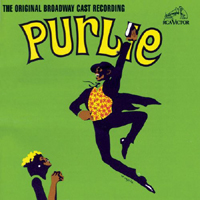 Original Broadway Cast, 1970 (Ampex/RCA)
Original Broadway Cast, 1970 (Ampex/RCA)  (3 / 5) With music by Gary Geld and lyrics by Peter Udell, this show is based on the play Purlie Victorious (1961) by Ossie Davis, who is credited along with Udell and the show’s producer, Philip Rose, for the musical’s book. Neither version is often revived — presumably because, in both, the portrayals of African-Americans living in the Deep South “in the recent past” might be considered dicey by current standards. On the other hand, Purlie can still be quite palatable if viewed and presented as a broad satire, which was the approach taken by a well-reviewed 2023 Broadway revival of the original play. At any rate, the score of Purlie is quite wonderful, from the Gospel anthem “Walk Him Up the Stairs,” led by the roof-raising vocals of Linda Hopkins, straight through to the end. In the title role, Cleavon Little is dynamic and charismatic in the character-establishing “New Fangled Preacher Man” and other numbers. As Lutiebelle, the sweet, naïve, not very bright girl who’s in love with him, Melba Moore displays a thrilling voice of great range and power, especially in the show-stopping “I Got Love.” Novella Nelson is a worthy partner to Moore in the soulful duet “He Can Do It,” and it’s fun to hear Sherman Hemsley, who later gained fame on TV’s The Jeffersons, delivering the comedic “Skinnin’ a Cat.” Also offering colorful vocal portrayals (pardon the pun) are John Heffernan and C. David Colson as the musical’s only two white characters: the ridiculously racist Ol Cap’n Cotchipee and his progressive son, Charlie. Overall, the sound quality of the cast recording is excellent. — Michael Portantiere
(3 / 5) With music by Gary Geld and lyrics by Peter Udell, this show is based on the play Purlie Victorious (1961) by Ossie Davis, who is credited along with Udell and the show’s producer, Philip Rose, for the musical’s book. Neither version is often revived — presumably because, in both, the portrayals of African-Americans living in the Deep South “in the recent past” might be considered dicey by current standards. On the other hand, Purlie can still be quite palatable if viewed and presented as a broad satire, which was the approach taken by a well-reviewed 2023 Broadway revival of the original play. At any rate, the score of Purlie is quite wonderful, from the Gospel anthem “Walk Him Up the Stairs,” led by the roof-raising vocals of Linda Hopkins, straight through to the end. In the title role, Cleavon Little is dynamic and charismatic in the character-establishing “New Fangled Preacher Man” and other numbers. As Lutiebelle, the sweet, naïve, not very bright girl who’s in love with him, Melba Moore displays a thrilling voice of great range and power, especially in the show-stopping “I Got Love.” Novella Nelson is a worthy partner to Moore in the soulful duet “He Can Do It,” and it’s fun to hear Sherman Hemsley, who later gained fame on TV’s The Jeffersons, delivering the comedic “Skinnin’ a Cat.” Also offering colorful vocal portrayals (pardon the pun) are John Heffernan and C. David Colson as the musical’s only two white characters: the ridiculously racist Ol Cap’n Cotchipee and his progressive son, Charlie. Overall, the sound quality of the cast recording is excellent. — Michael Portantiere
Pump Boys and Dinettes
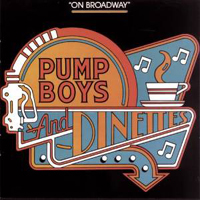 Original Cast, 1982 (Columbia/Sony)
Original Cast, 1982 (Columbia/Sony)  (4 / 5) An unexpected delight when it opened, this revue of countryish songs doesn’t have much in the way of a story line. The setup of a roadside stop populated by a quartet of service-station fellas and a pair of flirtatious waitresses was simply an excuse to keep on singing. Cast members Jim Wann, Mark Hardwick, John Foley, John Schimmel, Debra Monk, and Cass Morgan wrote material for the show and/or played instruments convincingly, performing with nice dollops of personality. The recording contains 19 numbers that would still perk up any country-music play list. Three of the tracks — “Be Good or Be Gone,” “The Night Dolly Parton Was Almost Mine,” and “Sisters” — were produced by Billy Sherrill, the rest by Mike Berniker. Don’t try looking for conflict or character development in these songs; just kick back in your boots, and listen up. — David Finkle
(4 / 5) An unexpected delight when it opened, this revue of countryish songs doesn’t have much in the way of a story line. The setup of a roadside stop populated by a quartet of service-station fellas and a pair of flirtatious waitresses was simply an excuse to keep on singing. Cast members Jim Wann, Mark Hardwick, John Foley, John Schimmel, Debra Monk, and Cass Morgan wrote material for the show and/or played instruments convincingly, performing with nice dollops of personality. The recording contains 19 numbers that would still perk up any country-music play list. Three of the tracks — “Be Good or Be Gone,” “The Night Dolly Parton Was Almost Mine,” and “Sisters” — were produced by Billy Sherrill, the rest by Mike Berniker. Don’t try looking for conflict or character development in these songs; just kick back in your boots, and listen up. — David Finkle
Promises, Promises
 Original Broadway Cast, 1968 (United Artists/MGM/Kritzerland)
Original Broadway Cast, 1968 (United Artists/MGM/Kritzerland)  (3 / 5) Based on the film The Apartment, this show was the only Broadway effort of pop songwriters Burt Bacharach (music) and Hal David (lyrics), who had written such hits as “Alfie,” “One Less Bell to Answer,” and “Do You Know the Way to San Jose?” As originally released, the cast recording of Promises, Promises was highly problematic. To begin with, the usually wonderful Jerry Orbach sounded under pitch as Chuck Baxter in several cuts, notably in “She Likes Basketball” and two duets, “Our Little Secret” (with Edward Winter as J. D. Sheldrake) and “A Young Pretty Girl Like You” (with A. Larry Haines as Dr. Dreyfuss). In those last two named songs, it was hard to tell who was singing farther off pitch, Orbach or his duet partners, but both cuts had some painful-to-hear moments. Also, in the original mix of the album, there was an excessive amount of reverb in the vocals, while the percussion sounded too heavy and the strings remote. The happy news is that a latter-day remastering of this recording for the Kritzerland label ameliorated most of these problems (not including the excessive reverb, which wasn’t fixable) through skillful remixing and pitch correction, greatly improving the listening experience. As Fran Kubelik, the young woman caught between Baxter and Sheldrake, Jill O’Hara displays a voice with a folk-singer quality that some Broadway musical aficionados may not appreciate, but this score is far from typical Broadway, and in fact, Bacharach has gone on record as saying that he wrote Fran’s songs with O’Hara’s sound specifically in mind. Several songs in this show are marred by David’s sometimes ham-fisted lyrics, but the good work (“Half as Big as Life,” “Knowing When to Leave,” “I’Il Never Fall in Love Again,” the title song, and others) finally outweighs the bad. Note: According to the album credits, you can supposedly hear Donna McKechnie singing along with Baayork Lee and Margo Sappington in “Turkey Lurkey Time,” but the number was actually recorded by the show’s “orchestra voices.” — Michael Portantiere
(3 / 5) Based on the film The Apartment, this show was the only Broadway effort of pop songwriters Burt Bacharach (music) and Hal David (lyrics), who had written such hits as “Alfie,” “One Less Bell to Answer,” and “Do You Know the Way to San Jose?” As originally released, the cast recording of Promises, Promises was highly problematic. To begin with, the usually wonderful Jerry Orbach sounded under pitch as Chuck Baxter in several cuts, notably in “She Likes Basketball” and two duets, “Our Little Secret” (with Edward Winter as J. D. Sheldrake) and “A Young Pretty Girl Like You” (with A. Larry Haines as Dr. Dreyfuss). In those last two named songs, it was hard to tell who was singing farther off pitch, Orbach or his duet partners, but both cuts had some painful-to-hear moments. Also, in the original mix of the album, there was an excessive amount of reverb in the vocals, while the percussion sounded too heavy and the strings remote. The happy news is that a latter-day remastering of this recording for the Kritzerland label ameliorated most of these problems (not including the excessive reverb, which wasn’t fixable) through skillful remixing and pitch correction, greatly improving the listening experience. As Fran Kubelik, the young woman caught between Baxter and Sheldrake, Jill O’Hara displays a voice with a folk-singer quality that some Broadway musical aficionados may not appreciate, but this score is far from typical Broadway, and in fact, Bacharach has gone on record as saying that he wrote Fran’s songs with O’Hara’s sound specifically in mind. Several songs in this show are marred by David’s sometimes ham-fisted lyrics, but the good work (“Half as Big as Life,” “Knowing When to Leave,” “I’Il Never Fall in Love Again,” the title song, and others) finally outweighs the bad. Note: According to the album credits, you can supposedly hear Donna McKechnie singing along with Baayork Lee and Margo Sappington in “Turkey Lurkey Time,” but the number was actually recorded by the show’s “orchestra voices.” — Michael Portantiere
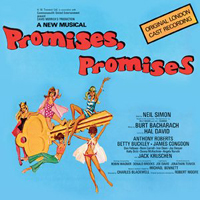 Original London Cast, 1969 (United Artists/Kritzerland)
Original London Cast, 1969 (United Artists/Kritzerland)  (3 / 5) This recording was out of print for years, until it finally received an excellent if belated digital transfer and release by Kritzerland. The two leads, Tony Roberts and Betty Buckley, were still in the very early stages of their careers in 1969, but both went on to become established Broadway stars. Roberts is charming in Baxter’s songs, and if Buckley’s steely belt/soprano certainly won’t appeal to everyone, her performance is committed. (Buckley’s best vocal moment by far is “I’ll Never Fall in Love Again,” sung softly and lyrically rather than belted.) James Congdon as Sheldrake sings “Wanting Things” well, if not with quite as much voice as Edward Winters on the recording reviewed above. It’s interesting to note that the three leading performers heard on this London cast album are American, and it’s amusing that Buckley adopts a British pronunciation when she sings certain words — for example, “portrait” in “You’ll Think of Someone” and “return” in “Knowing When to Leave.” A major plus of the recording is its superb technical quality; Jonathan Tunick’s orchestrations sound magnificent here, with the strings more prominent than on the OBCR, while the voices are recorded with a great deal of presence and no excess of reverb. Note: Donna McKechnie traveled to London with the show and is again credited on the cast album, but you won’t hear her singing on “Turkey Lurkey Time” track here, either. — M.P.
(3 / 5) This recording was out of print for years, until it finally received an excellent if belated digital transfer and release by Kritzerland. The two leads, Tony Roberts and Betty Buckley, were still in the very early stages of their careers in 1969, but both went on to become established Broadway stars. Roberts is charming in Baxter’s songs, and if Buckley’s steely belt/soprano certainly won’t appeal to everyone, her performance is committed. (Buckley’s best vocal moment by far is “I’ll Never Fall in Love Again,” sung softly and lyrically rather than belted.) James Congdon as Sheldrake sings “Wanting Things” well, if not with quite as much voice as Edward Winters on the recording reviewed above. It’s interesting to note that the three leading performers heard on this London cast album are American, and it’s amusing that Buckley adopts a British pronunciation when she sings certain words — for example, “portrait” in “You’ll Think of Someone” and “return” in “Knowing When to Leave.” A major plus of the recording is its superb technical quality; Jonathan Tunick’s orchestrations sound magnificent here, with the strings more prominent than on the OBCR, while the voices are recorded with a great deal of presence and no excess of reverb. Note: Donna McKechnie traveled to London with the show and is again credited on the cast album, but you won’t hear her singing on “Turkey Lurkey Time” track here, either. — M.P.
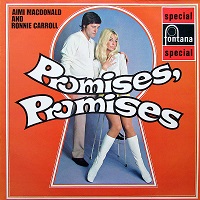 London Studio Cast, 1969 (Fontana Special/no CD)
London Studio Cast, 1969 (Fontana Special/no CD)  (2 / 5) While this studio cast album of Promises, Promises would never be chosen as anyone’s preferred recording, it has some strong points and intriguing elements that make it worth a listen. (The album never got a commercial CD transfer but is available online as a download.) Ronnie Carroll brings more of a pop crooner’s sound than a Broadway baritenor to Chuck Baxter’s songs, but he does so very pleasantly. Following in the footsteps of Jill O’Hara and Betty Buckley, Aimi MacDonald gives yet another vocally controversial performance as Fran Kubelik. Her voice has a very bright, little-girl quality that some listeners will find charming, others annoying. Also, MacDonald is pitch-shy at times, and her thick Brit accent is distracting in that she’s playing an American in a story set in NYC. On the plus side, Patricia Whitmore as Marge MacDougall is a delightful partner for Carroll on “A Fact Can Be a Beautiful Thing.” Five songs from the score are nowhere to be found here — “Grapes of Roth,” “Our Little Secret,” “Wanting Things, “A Young, Pretty Girl Like You,” and the wistful “Christmas Day” — so their absence represents five more strikes against this recording. Among the songs that are included, three of them have had their keys transposed: “You’ll Think of Someone,” “Whoever You Are,” and “Promises, Promises” are all slightly higher than on the original Broadway and London cast albums. Keith Roberts conducts the score with verve, in orchestrations and vocal arrangements for the “orchestra voices” that sound like the brilliant originals slightly revised in certain sections. “I’ll Never Fall in Love Again” has been thrown into the overture, between “She Likes Basketball” and the title song; it’s an unnecessary addition, but fun to hear in an alternate version of one of the most excitingly written and orchestrated overtures in Broadway history. — M.P.
(2 / 5) While this studio cast album of Promises, Promises would never be chosen as anyone’s preferred recording, it has some strong points and intriguing elements that make it worth a listen. (The album never got a commercial CD transfer but is available online as a download.) Ronnie Carroll brings more of a pop crooner’s sound than a Broadway baritenor to Chuck Baxter’s songs, but he does so very pleasantly. Following in the footsteps of Jill O’Hara and Betty Buckley, Aimi MacDonald gives yet another vocally controversial performance as Fran Kubelik. Her voice has a very bright, little-girl quality that some listeners will find charming, others annoying. Also, MacDonald is pitch-shy at times, and her thick Brit accent is distracting in that she’s playing an American in a story set in NYC. On the plus side, Patricia Whitmore as Marge MacDougall is a delightful partner for Carroll on “A Fact Can Be a Beautiful Thing.” Five songs from the score are nowhere to be found here — “Grapes of Roth,” “Our Little Secret,” “Wanting Things, “A Young, Pretty Girl Like You,” and the wistful “Christmas Day” — so their absence represents five more strikes against this recording. Among the songs that are included, three of them have had their keys transposed: “You’ll Think of Someone,” “Whoever You Are,” and “Promises, Promises” are all slightly higher than on the original Broadway and London cast albums. Keith Roberts conducts the score with verve, in orchestrations and vocal arrangements for the “orchestra voices” that sound like the brilliant originals slightly revised in certain sections. “I’ll Never Fall in Love Again” has been thrown into the overture, between “She Likes Basketball” and the title song; it’s an unnecessary addition, but fun to hear in an alternate version of one of the most excitingly written and orchestrated overtures in Broadway history. — M.P.
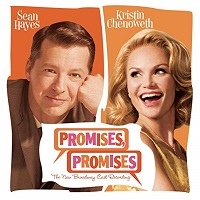 Broadway Cast, 2010 (Masterworks Broadway)
Broadway Cast, 2010 (Masterworks Broadway)  (2 / 5) The 2010 Broadway revisal of Promises, Promises was marred by poor direction (Rob Ashford was responsible) and the ill-advised, unnecessary interpolation of two Bacharach-David hits that were not in the original score, “I Say a Little Prayer” and “A House is Not a Home.” But the slack direction is, of course, not evident on the cast album, and the added songs are enjoyable in their own right out of context, so this recording is an agreeable listening experience overall. A stumbling block for some listeners may be the buzz-saw vibrato of Sean Hayes’s voice as heard in Chuck Baxter’s multiple songs, surely not to everyone’s taste. More pleasant to hear is Kristin Chenoweth as Fran, even if her songs are sung in keys much lower than the soprano range in which she’s most at home. Although Tony Goldwyn is not known as a singer, he does a fine job with Sheldrake’s “Wanting Things” and his duet with Hayes, “Our Little Secret.” Katie Finneran is a comic delight as Marge MacDougall, playing off Hayes expertly in “A Fact Can Be a Beautiful Thing,” and Jonathan Tunick’s adaptations of his own original orchestrations sound pretty great. — M.P.
(2 / 5) The 2010 Broadway revisal of Promises, Promises was marred by poor direction (Rob Ashford was responsible) and the ill-advised, unnecessary interpolation of two Bacharach-David hits that were not in the original score, “I Say a Little Prayer” and “A House is Not a Home.” But the slack direction is, of course, not evident on the cast album, and the added songs are enjoyable in their own right out of context, so this recording is an agreeable listening experience overall. A stumbling block for some listeners may be the buzz-saw vibrato of Sean Hayes’s voice as heard in Chuck Baxter’s multiple songs, surely not to everyone’s taste. More pleasant to hear is Kristin Chenoweth as Fran, even if her songs are sung in keys much lower than the soprano range in which she’s most at home. Although Tony Goldwyn is not known as a singer, he does a fine job with Sheldrake’s “Wanting Things” and his duet with Hayes, “Our Little Secret.” Katie Finneran is a comic delight as Marge MacDougall, playing off Hayes expertly in “A Fact Can Be a Beautiful Thing,” and Jonathan Tunick’s adaptations of his own original orchestrations sound pretty great. — M.P.
Promenade
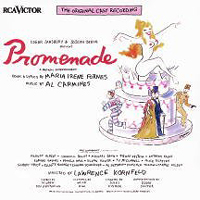 Original Off-Broadway Cast, 1969 (RCA) ]usr=1] Two prisoners identified as “105” and “106” escape from jail and wander through various settings, including a park, a banquet, and a battlefield. Among the people they encounter are Mr. R., Mr. S., Miss 0, and a bereaved woman who thinks she’s their mother. At the end of the day, they return to prison. Only in the 1960s could something like this get a commercial production, let alone achieve a half-decent run and earn a measure of critical respect. Promenade is obvious in its details — the usual points are made about rich and poor, there’s a scene spoofing the foolishness of war, and so on — and utterly impenetrable in its overall intentions, but the show gained a following in its seven-month run at the theater of the same name. Today, it seems just another baffling artifact of an era when plot and character were regularly thrown to the wind. Maria Irene Fornes is the gnomic librettist-lyricist. Composer AI Carmines’ melodies owe a debt to Kurt Weill, but there are several catchy tunes. Among them are “Unrequited Love,” “The Clothes Make the Man,” and “Capricious and Fickle,” the latter belted by Alice Playten. As recorded, the score is not unpleasant, but neither is it compelling. — David Barbour
Original Off-Broadway Cast, 1969 (RCA) ]usr=1] Two prisoners identified as “105” and “106” escape from jail and wander through various settings, including a park, a banquet, and a battlefield. Among the people they encounter are Mr. R., Mr. S., Miss 0, and a bereaved woman who thinks she’s their mother. At the end of the day, they return to prison. Only in the 1960s could something like this get a commercial production, let alone achieve a half-decent run and earn a measure of critical respect. Promenade is obvious in its details — the usual points are made about rich and poor, there’s a scene spoofing the foolishness of war, and so on — and utterly impenetrable in its overall intentions, but the show gained a following in its seven-month run at the theater of the same name. Today, it seems just another baffling artifact of an era when plot and character were regularly thrown to the wind. Maria Irene Fornes is the gnomic librettist-lyricist. Composer AI Carmines’ melodies owe a debt to Kurt Weill, but there are several catchy tunes. Among them are “Unrequited Love,” “The Clothes Make the Man,” and “Capricious and Fickle,” the latter belted by Alice Playten. As recorded, the score is not unpleasant, but neither is it compelling. — David Barbour
The Producers
 Original Broadway Cast, 2001 (Sony)
Original Broadway Cast, 2001 (Sony)  (5 / 5) Here is Mel Brooks’ full-blown musical version of his semi-musical 1968 movie about a has-been Broadway producer’s backfired scheme to bilk his show’s investors by staging a colossal flop. This recording has all the excitement of the Broadway smash hit, and the star power of Nathan Lane and Matthew Broderick comes through in one of the brashest cast albums ever made. The Producers epitomizes Borscht Belt humor; Brooks’ clever songs are charming and hilariously offensive at the same time. While many of the numbers are obvious pastiches of Tin Pan Alley standards, they’re sturdy enough to progress the uproarious plot rapidly and effectively. The show opened to extravagant critical and audience acclaim, and it garnered a record 12 Tony Awards. The performances of Lane as the frantic producer Max Bialystock and Broderick as Leo Bloom, the panicky accountant who becomes Max’s co-producer, display a comic brilliance unheard on cast albums since the days of Zero Mostel and Carol Channing. Also brilliant is Gary Beach as Roger De Bris, the effete, delusional director who ultimately portrays a Judy Garland-like Hitler in the show’s outrageous centerpiece production number, “Springtime for Hitler” — one of this recording’s major highlights. Roger Bart as De Bris’ “common-law assistant,” Carmen Ghia, shines no less brightly. Other highlights are Cady Huffman as Ulla belting out “When You’ve Got It, Flaunt It” and Brad Oscar as Franz Liebkind selling “Haben Sie Gehört das Deutsche Band?” Nathan Lane’s marathon “Betrayed” is a tour de force, and the finale, “Prisoners of Love (Leo & Max),” is spine-tingling in classic Broadway style. — Gerard Alessandrini
(5 / 5) Here is Mel Brooks’ full-blown musical version of his semi-musical 1968 movie about a has-been Broadway producer’s backfired scheme to bilk his show’s investors by staging a colossal flop. This recording has all the excitement of the Broadway smash hit, and the star power of Nathan Lane and Matthew Broderick comes through in one of the brashest cast albums ever made. The Producers epitomizes Borscht Belt humor; Brooks’ clever songs are charming and hilariously offensive at the same time. While many of the numbers are obvious pastiches of Tin Pan Alley standards, they’re sturdy enough to progress the uproarious plot rapidly and effectively. The show opened to extravagant critical and audience acclaim, and it garnered a record 12 Tony Awards. The performances of Lane as the frantic producer Max Bialystock and Broderick as Leo Bloom, the panicky accountant who becomes Max’s co-producer, display a comic brilliance unheard on cast albums since the days of Zero Mostel and Carol Channing. Also brilliant is Gary Beach as Roger De Bris, the effete, delusional director who ultimately portrays a Judy Garland-like Hitler in the show’s outrageous centerpiece production number, “Springtime for Hitler” — one of this recording’s major highlights. Roger Bart as De Bris’ “common-law assistant,” Carmen Ghia, shines no less brightly. Other highlights are Cady Huffman as Ulla belting out “When You’ve Got It, Flaunt It” and Brad Oscar as Franz Liebkind selling “Haben Sie Gehört das Deutsche Band?” Nathan Lane’s marathon “Betrayed” is a tour de force, and the finale, “Prisoners of Love (Leo & Max),” is spine-tingling in classic Broadway style. — Gerard Alessandrini
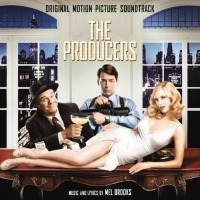 Film Soundtrack, 2005 (Sony)
Film Soundtrack, 2005 (Sony)  (3 / 5) Although the movie version of this hysterical Broadway smash was generally regarded as an inferior stage-to-screen adaptation, the soundtrack album is highly enjoyable overall. The film may have lacked a cinematic flair in being overly faithful to the stage version, but the score was given a full-blown movie musical treatment, to wondrous effect. The orchestrations by Doug Besterman and Larry Blank are a joy to listen to, as are the expanded choruses, and the zippy musical direction of Patrick S. Brady adds just the right amount of over-the-top frenzy. Almost all of the songs from the show score are retained, as well as the brilliant performances of Nathan Lane and Mathew Broderick. Vocally, these two sound even better here than on the original Broadway cast album. A new performance, by John Barrowman as the lead tenor in “Springtime For Hitler,” is at once vocally thrilling and appropriately campy. On the minus side, a major let-down is the absence of Brad Oscar singing “Haben Sie Gehört Das Deutsches Band?”’ The rendition heard here, by the better-known Will Ferrell, lacks enough energy to be funny. And while Uma Thurman may have looked good in the movie as Ulla, her solo “When You’ve Got It, Flaunt It” also misses the punch of the original stage performance by Cady Huffman. But if you skip these tracks, this is a fine and very listenable recording of one of the funniest musicals ever created. — G.A.
(3 / 5) Although the movie version of this hysterical Broadway smash was generally regarded as an inferior stage-to-screen adaptation, the soundtrack album is highly enjoyable overall. The film may have lacked a cinematic flair in being overly faithful to the stage version, but the score was given a full-blown movie musical treatment, to wondrous effect. The orchestrations by Doug Besterman and Larry Blank are a joy to listen to, as are the expanded choruses, and the zippy musical direction of Patrick S. Brady adds just the right amount of over-the-top frenzy. Almost all of the songs from the show score are retained, as well as the brilliant performances of Nathan Lane and Mathew Broderick. Vocally, these two sound even better here than on the original Broadway cast album. A new performance, by John Barrowman as the lead tenor in “Springtime For Hitler,” is at once vocally thrilling and appropriately campy. On the minus side, a major let-down is the absence of Brad Oscar singing “Haben Sie Gehört Das Deutsches Band?”’ The rendition heard here, by the better-known Will Ferrell, lacks enough energy to be funny. And while Uma Thurman may have looked good in the movie as Ulla, her solo “When You’ve Got It, Flaunt It” also misses the punch of the original stage performance by Cady Huffman. But if you skip these tracks, this is a fine and very listenable recording of one of the funniest musicals ever created. — G.A.
The Prince and the Pauper
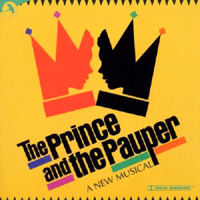 Original Off-Broadway Cast, 2002 (JAY)
Original Off-Broadway Cast, 2002 (JAY)  (2 / 5) Based on Mark Twain’s novel about a pair of 16th-century London lookalikes who swap identities, this adaptation of The Prince and the Pauper played a respectable 194 performances Off-Broadway. With music by Neil Berg, lyrics by Berg and Bernie Garzia, and a book by Garzia and Ray Roderick, the show is an adventure-soaked musical with pop-opera inflections. The score is sprightly, performed by a strong cast of 13 singing actors, many of whom play multiple roles and give their all on this recording. Most notable for their talent and energy are Dennis Michael Hall as the Tudor prince who pretends to be a commoner and Gerard Canonico as the slum lad masquerading as royalty. John Glaudini’s orchestrations and arrangements, played by a three-person combo — Glaudini on piano, Anne-Marie Tranchida on cello, and Frank Basile on reeds — lend a full, swashbuckling sound to the proceedings. True to Twain’s source material, this is a children’s piece with enough satiric edge to be enjoyed by adults as well. — Charles Wright
(2 / 5) Based on Mark Twain’s novel about a pair of 16th-century London lookalikes who swap identities, this adaptation of The Prince and the Pauper played a respectable 194 performances Off-Broadway. With music by Neil Berg, lyrics by Berg and Bernie Garzia, and a book by Garzia and Ray Roderick, the show is an adventure-soaked musical with pop-opera inflections. The score is sprightly, performed by a strong cast of 13 singing actors, many of whom play multiple roles and give their all on this recording. Most notable for their talent and energy are Dennis Michael Hall as the Tudor prince who pretends to be a commoner and Gerard Canonico as the slum lad masquerading as royalty. John Glaudini’s orchestrations and arrangements, played by a three-person combo — Glaudini on piano, Anne-Marie Tranchida on cello, and Frank Basile on reeds — lend a full, swashbuckling sound to the proceedings. True to Twain’s source material, this is a children’s piece with enough satiric edge to be enjoyed by adults as well. — Charles Wright
Prodigal Son
 Original Australian Cast, 2000 (Prodigal Son Productions)
Original Australian Cast, 2000 (Prodigal Son Productions)  (3 / 5) Australian librettist-lyricist Dean Bryant and composer Matthew Frank took inspiration from the Bible for their musical Prodigal Son. They updated the story to present-day Australia and made the central figure of the straying son returning to the fold a young man named Luke, who’s coping with his homosexuality. As the recording reveals, this is an intimate show, with only piano accompaniment played by the composer. The score deals with the larger implications of small issues, capturing the oppressive aspects of an everyday rural existence (“Happy Families”) and the allure of a life with more choices (“Run With the Tide”). Several moving songs express the growing pains experienced by children (“Out of Myself,” “Epiphany”) as well as their parents (“My Boy,” “Love Them and Leave Them Alone”). Bryant himself gives an engaging performance as Luke; Jules Hutchinson is persuasive as his mother; Barry Mitchell is a bit bland as Luke’s father; Graham Pages is adequate in dual roles as Luke’s brother and boyfriend; and Amanda Levy as Maddy, a performance artist, gives fine if undistinguished support. The disc includes a bonus track of a song from a subsequent Bryant-Frank musical, Emoh Ruo, sung by Levy. — Matthew Murray
(3 / 5) Australian librettist-lyricist Dean Bryant and composer Matthew Frank took inspiration from the Bible for their musical Prodigal Son. They updated the story to present-day Australia and made the central figure of the straying son returning to the fold a young man named Luke, who’s coping with his homosexuality. As the recording reveals, this is an intimate show, with only piano accompaniment played by the composer. The score deals with the larger implications of small issues, capturing the oppressive aspects of an everyday rural existence (“Happy Families”) and the allure of a life with more choices (“Run With the Tide”). Several moving songs express the growing pains experienced by children (“Out of Myself,” “Epiphany”) as well as their parents (“My Boy,” “Love Them and Leave Them Alone”). Bryant himself gives an engaging performance as Luke; Jules Hutchinson is persuasive as his mother; Barry Mitchell is a bit bland as Luke’s father; Graham Pages is adequate in dual roles as Luke’s brother and boyfriend; and Amanda Levy as Maddy, a performance artist, gives fine if undistinguished support. The disc includes a bonus track of a song from a subsequent Bryant-Frank musical, Emoh Ruo, sung by Levy. — Matthew Murray
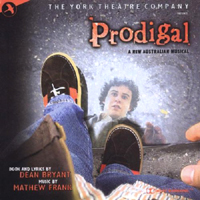 Original Off-Broadway Cast, 2002 (JAY)
Original Off-Broadway Cast, 2002 (JAY)  (3 / 5)The title of Bryant and Frank’s musical was shortened to Prodigal for its 2002 York Theatre production, but the show lost none of its emotional power on the journey from Australia to New York. In fact, this recording has more energy and humor than the original. Joshua Park embodies Luke’s youth and naivete very well, and Kerry Butler makes Maddy a force to be reckoned with. David Hess and Alison Fraser depict Luke’s parents with plenty of outer strength to mask the fragility of their frightened inner selves. The only weak link is Christian Bode in the boyfriend/brother roles, which seemed vital onstage but aren’t well established through song. Australian musicals with original scores don’t often show up in America, but this recording makes an excellent case for Prodigal. — M.M.
(3 / 5)The title of Bryant and Frank’s musical was shortened to Prodigal for its 2002 York Theatre production, but the show lost none of its emotional power on the journey from Australia to New York. In fact, this recording has more energy and humor than the original. Joshua Park embodies Luke’s youth and naivete very well, and Kerry Butler makes Maddy a force to be reckoned with. David Hess and Alison Fraser depict Luke’s parents with plenty of outer strength to mask the fragility of their frightened inner selves. The only weak link is Christian Bode in the boyfriend/brother roles, which seemed vital onstage but aren’t well established through song. Australian musicals with original scores don’t often show up in America, but this recording makes an excellent case for Prodigal. — M.M.
Prettybelle
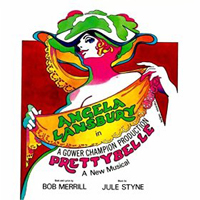 Original Cast, 1971 (Original Cast Records/Varèse Sarabande)
Original Cast, 1971 (Original Cast Records/Varèse Sarabande)  (4 / 5) A woman who lives in the Deep South wants to repent for her husband’s deplorable hostilities toward minorities — so she beds black and Hispanic men. With such a contrived plot, it’s no surprise that Prettybelle folded quickly in Boston, but a tuneful, Southern-tinged score by the great composer Jule Styne survives and was recorded years after the show closed. From the lazy waltz of the title tune to a rollicking Dixieland march, Styne’s music, joined to wonderfully evocative lyrics by Bob Merrill, is performed by one of Broadway’s greatest leading ladies, Angela Lansbury. She’s absolutely brilliant in the plaintive “To a Small Degree,” wherein Prettybelle describes her marriage. Her angry delivery of “How Could I Know?” reveals the character’s devastating discovery of her husband’s vileness, and Lansbury really socks it to us with “When I’m Drunk, I’m Beautiful,” the 11-o’clock blockbuster. — Peter Filichia
(4 / 5) A woman who lives in the Deep South wants to repent for her husband’s deplorable hostilities toward minorities — so she beds black and Hispanic men. With such a contrived plot, it’s no surprise that Prettybelle folded quickly in Boston, but a tuneful, Southern-tinged score by the great composer Jule Styne survives and was recorded years after the show closed. From the lazy waltz of the title tune to a rollicking Dixieland march, Styne’s music, joined to wonderfully evocative lyrics by Bob Merrill, is performed by one of Broadway’s greatest leading ladies, Angela Lansbury. She’s absolutely brilliant in the plaintive “To a Small Degree,” wherein Prettybelle describes her marriage. Her angry delivery of “How Could I Know?” reveals the character’s devastating discovery of her husband’s vileness, and Lansbury really socks it to us with “When I’m Drunk, I’m Beautiful,” the 11-o’clock blockbuster. — Peter Filichia
Porgy and Bess
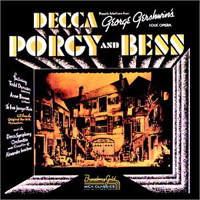 Original Broadway Cast Members, 1940/1942 (Decca)
Original Broadway Cast Members, 1940/1942 (Decca)  (5 / 5) Porgy and Bess may be the most fabulous failure in musical theater history, although it can only be judged a failure in that its original 1935 run of 124 performances at the Alvin Theatre was brief by Broadway standards, and not financially successful. George Gershwin’s iconic work is based on the play Porgy by Dorothy and DuBose Hayward; the latter was the primary librettist-lyricist for Porgy and Bess, with Ira Gershwin collaborating on the lyrics. It might be argued that recordings of this full-fledged opera should not be reviewed along with those of musicals, but Porgy and Bess has become part of the fabric of American culture in a way that Regina, The Consul, and other operas that played on Broadway never did. If critics and audiences didn’t fully appreciate the work in 1935, they certainly came to do so in the years following George Gershwin’s tragic, early death in 1937. The first recordings reviewed here were made by members of the original Broadway cast and others several years after the fact, under the leadership of the opera’s original conductor, Alexander Smallens. Todd Duncan and Anne Brown sing gloriously in the title roles, and their rendition of the beautiful duet “Bess, You Is My Woman Now” has served as a benchmark for every subsequent recording. This compilation also offers Duncan and Brown performing several songs that were written to be sung by other characters: She does Clara’s “Summertime” and Serena’s “My Man’s Gone Now,” he does Sportin’ Life’s “It Ain’t Necessarily So” and Crown’s part in “What You Want Wid Bess?” John Bubbles, the original Sportin’ Life, is not among the singers here; Avon Long, who played the part in the 1942 revival, does “There’s a Boat That’s Leavin’ Soon for New York” and is also heard in a bonus track of Porgy’s “I Got Plenty o’ Nuttin” that features a jazzy arrangement for the Leo Reisman Orchestra. The only other original cast member represented here among the leads and featured players is the rich-voiced Edward Matthews as Jake, singing “A Woman Is a Sometime Thing” and “It Take a Long Pull To Get There.” This album represents only a small fraction of the three-hour score, and it has unfortunate interior cuts in some of the selections — for example, “Porgy’s Lament” is bereft of the wonderful counterpoint parts for Maria and Serena. Still, the wonder of these recordings lies not in their completeness but in their authenticity. (Note: Three months before the opera’s Broadway premiere, excerpts from the score were recorded in a CBS studio with Gershwin conducting several of the original cast members and a 43 piece orchestra. Those recordings are available on the MusicMasters CD Gershwin Performs Gershwin. They are precious in allowing us to hear “Summertime” and “My Man’s Gone Now” as conducted by the composer and sung by their original interpreters, Abbie Mitchell as Clara and Ruby Elzy as Serena.) — Michael Portantiere
(5 / 5) Porgy and Bess may be the most fabulous failure in musical theater history, although it can only be judged a failure in that its original 1935 run of 124 performances at the Alvin Theatre was brief by Broadway standards, and not financially successful. George Gershwin’s iconic work is based on the play Porgy by Dorothy and DuBose Hayward; the latter was the primary librettist-lyricist for Porgy and Bess, with Ira Gershwin collaborating on the lyrics. It might be argued that recordings of this full-fledged opera should not be reviewed along with those of musicals, but Porgy and Bess has become part of the fabric of American culture in a way that Regina, The Consul, and other operas that played on Broadway never did. If critics and audiences didn’t fully appreciate the work in 1935, they certainly came to do so in the years following George Gershwin’s tragic, early death in 1937. The first recordings reviewed here were made by members of the original Broadway cast and others several years after the fact, under the leadership of the opera’s original conductor, Alexander Smallens. Todd Duncan and Anne Brown sing gloriously in the title roles, and their rendition of the beautiful duet “Bess, You Is My Woman Now” has served as a benchmark for every subsequent recording. This compilation also offers Duncan and Brown performing several songs that were written to be sung by other characters: She does Clara’s “Summertime” and Serena’s “My Man’s Gone Now,” he does Sportin’ Life’s “It Ain’t Necessarily So” and Crown’s part in “What You Want Wid Bess?” John Bubbles, the original Sportin’ Life, is not among the singers here; Avon Long, who played the part in the 1942 revival, does “There’s a Boat That’s Leavin’ Soon for New York” and is also heard in a bonus track of Porgy’s “I Got Plenty o’ Nuttin” that features a jazzy arrangement for the Leo Reisman Orchestra. The only other original cast member represented here among the leads and featured players is the rich-voiced Edward Matthews as Jake, singing “A Woman Is a Sometime Thing” and “It Take a Long Pull To Get There.” This album represents only a small fraction of the three-hour score, and it has unfortunate interior cuts in some of the selections — for example, “Porgy’s Lament” is bereft of the wonderful counterpoint parts for Maria and Serena. Still, the wonder of these recordings lies not in their completeness but in their authenticity. (Note: Three months before the opera’s Broadway premiere, excerpts from the score were recorded in a CBS studio with Gershwin conducting several of the original cast members and a 43 piece orchestra. Those recordings are available on the MusicMasters CD Gershwin Performs Gershwin. They are precious in allowing us to hear “Summertime” and “My Man’s Gone Now” as conducted by the composer and sung by their original interpreters, Abbie Mitchell as Clara and Ruby Elzy as Serena.) — Michael Portantiere
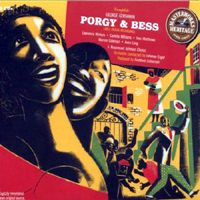 Studio Cast, 1951 (Columbia, 2CDs)
Studio Cast, 1951 (Columbia, 2CDs)  (5 / 5) While this recording is not “complete” as advertised, it contains so much more of Porgy and Bess than had previously been recorded that the exaggeration can be forgiven. Of the many fine studio recordings of great musical theater scores conducted by Lehman Engel and produced by Goddard Lieberson, this one is the cream of the crop. Among the singers are original cast members Warren Coleman as Crown, Edward Matthews as Jake, J. Rosamond Johnson as Frazier, and Helen Dowdy, who sings Maria in addition to her original role of Lily. Coleman lunges at some of the notes and speaks rather than sings much of Crown’s music, but he makes the character dramatically potent and truly menacing. Avon Long is back as Sportin’ Life, and although his voice isn’t ideal for the part as written, his performance oozes with personality. Camilla Williams is somewhat disappointing as Bess; although she displays a strong and beautiful soprano that enabled her to sing such roles as Madame Butterfly and Aida with great success, she comes across as a bit too refined and lacking in sensuality for Bess, and her avoidance of chest tones makes her lower register sound weak at several key moments in the score. But Lawrence Winters is absolutely magnificent as Porgy, in both musical and dramatic terms. His ringing high-baritone sounds ideal throughout, and then, just when you think he couldn’t possibly top himself, his delivery of the climactic line “I gotta be wid Bess” in the final scene is thrilling beyond description. Engel’s conducting is always on point, and the sound quality of the recording is excellent for 1951 mono. Overall, a triumph. — M.P.
(5 / 5) While this recording is not “complete” as advertised, it contains so much more of Porgy and Bess than had previously been recorded that the exaggeration can be forgiven. Of the many fine studio recordings of great musical theater scores conducted by Lehman Engel and produced by Goddard Lieberson, this one is the cream of the crop. Among the singers are original cast members Warren Coleman as Crown, Edward Matthews as Jake, J. Rosamond Johnson as Frazier, and Helen Dowdy, who sings Maria in addition to her original role of Lily. Coleman lunges at some of the notes and speaks rather than sings much of Crown’s music, but he makes the character dramatically potent and truly menacing. Avon Long is back as Sportin’ Life, and although his voice isn’t ideal for the part as written, his performance oozes with personality. Camilla Williams is somewhat disappointing as Bess; although she displays a strong and beautiful soprano that enabled her to sing such roles as Madame Butterfly and Aida with great success, she comes across as a bit too refined and lacking in sensuality for Bess, and her avoidance of chest tones makes her lower register sound weak at several key moments in the score. But Lawrence Winters is absolutely magnificent as Porgy, in both musical and dramatic terms. His ringing high-baritone sounds ideal throughout, and then, just when you think he couldn’t possibly top himself, his delivery of the climactic line “I gotta be wid Bess” in the final scene is thrilling beyond description. Engel’s conducting is always on point, and the sound quality of the recording is excellent for 1951 mono. Overall, a triumph. — M.P.
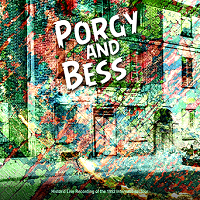 Touring Cast, 1952 (Guild/Kritzerland, 2CDs)
Touring Cast, 1952 (Guild/Kritzerland, 2CDs)  (4 / 5) In remarkably clear and full sound for its era, here’s a live recording of an international touring production of Porgy and Bess, taken from a radio broadcast of a performance in Berlin. Alexander Smallens, conductor of the original Broadway production as well as the 1942 revival, leads the RIAS Unterhaltungorchester and the Eva Jessye Choir in a performance that more than compensates in visceral excitement for whatever its flaws may be in terms of the editing of the score and other decisions. Those who know this work well in its complete form as written will immediately notice several oddities in this performance, a major one being the fact that a fair amount of the opera’s sung dialogue is declaimed over music rather than actually sung. There’s an awful lot of shouted ad-libbing by the chorus members in the group scenes, and though this does ramp up the excitement level, it also partly obscures some gorgeous melodies and orchestrations. And while much of the opera’s final scene is excised, Porgy’s frequently cut “Buzzard Song” is inserted there, at a point far too late in the action for it to make any dramatic sense or effect. But, but, but…..overall, this is a thrilling performance headed by two brilliant singers whose careers were boosted tremendously with this production, Leontyne Price and William Warfield. The pair would go on to record a phenomenal album of highlights from the opera years later (see review below), but it’s nice to hear them here in a fuller statement of the score. The balance of the cast is wonderful, with two disappointing exceptions: the Crown, John McCurry, appears to have been in poor voice for this performance, and Cab Calloway takes far too many liberties in the role of Sportin’ Life, often scatting around in a weird falsetto when he should just be singing the notes, thank you very much. Little matter. If the quirks and lapses of the performance make this recording far from definitive, it’s essential as an aural document of a viscerally exciting production that went a long way towards establishing this work as a masterpiece in the eyes and ears of the world at large. — M.P.
(4 / 5) In remarkably clear and full sound for its era, here’s a live recording of an international touring production of Porgy and Bess, taken from a radio broadcast of a performance in Berlin. Alexander Smallens, conductor of the original Broadway production as well as the 1942 revival, leads the RIAS Unterhaltungorchester and the Eva Jessye Choir in a performance that more than compensates in visceral excitement for whatever its flaws may be in terms of the editing of the score and other decisions. Those who know this work well in its complete form as written will immediately notice several oddities in this performance, a major one being the fact that a fair amount of the opera’s sung dialogue is declaimed over music rather than actually sung. There’s an awful lot of shouted ad-libbing by the chorus members in the group scenes, and though this does ramp up the excitement level, it also partly obscures some gorgeous melodies and orchestrations. And while much of the opera’s final scene is excised, Porgy’s frequently cut “Buzzard Song” is inserted there, at a point far too late in the action for it to make any dramatic sense or effect. But, but, but…..overall, this is a thrilling performance headed by two brilliant singers whose careers were boosted tremendously with this production, Leontyne Price and William Warfield. The pair would go on to record a phenomenal album of highlights from the opera years later (see review below), but it’s nice to hear them here in a fuller statement of the score. The balance of the cast is wonderful, with two disappointing exceptions: the Crown, John McCurry, appears to have been in poor voice for this performance, and Cab Calloway takes far too many liberties in the role of Sportin’ Life, often scatting around in a weird falsetto when he should just be singing the notes, thank you very much. Little matter. If the quirks and lapses of the performance make this recording far from definitive, it’s essential as an aural document of a viscerally exciting production that went a long way towards establishing this work as a masterpiece in the eyes and ears of the world at large. — M.P.
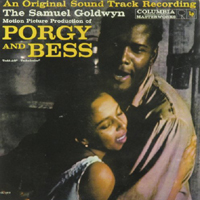 Film Soundtrack, 1959 (Columbia)
Film Soundtrack, 1959 (Columbia)  (3 / 5) This is an aural memento of a troubled film. The movie itself was withdrawn from circulation decades ago because it was despised by certain people who controlled the Gershwin estate, which held ownership of the rights, and even the soundtrack album has been out of print for years; I somehow acquired a Japanese CD pressing that sounds like it was transferred directly from the LP master tape, with no digital processing or remastering whatsoever. The film stars Sidney Poitier as Porgy, Dorothy Dandridge as Bess, Sammy Davis, Jr. as Sportin’ Life, Pearl Bailey as Maria, Brock Peters as Crown, Ruth Attaway as Serena, and Diahann Carroll as Clara, but only Davis, Bailey, and Peters do their own singing — and, for contractual reasons, Davis is not heard at all on this album. Instead, Cab Calloway sings Sportin’ Life’s “It Ain’t Necessarily So” and “There’s a Boat That’s Leavin’ Soon for New York” with an engaging personality that lacks the sense of evil necessary for the character. (At least Calloway here sings most of the notes as written, in contrast to the 1952 live performance recording reviewed above.) Another oddity of the film and the soundtrack recording is that, due to the rapidly changing racial sensibilities at the time, some of the performers sing the Catfish Row denizens’ dialect as originally written, but others do not; for example, in “I Can’t Sit Down,” the chorus sings “Today, I is gay and I’s free,” but Pearl Bailey sings “Today, I am gay and I’m free.” What we have presented here are pretty much the songs of Porgy and Bess; the movie retained very little of the opera’s sung dialogue, and there is none on the album. Despite its flaws, this recording is worth tracking down if only for baritone Robert McFerrin’s extraordinary performance of Porgy’s music, dubbed for Poitier, and Adele Addison’s lovely singing for Dandridge. Both rein in their operatic voices somewhat for the film medium, but they still sing beautifully under the skillful, respectful musical direction of André Previn and Ken Darby. — M.P.
(3 / 5) This is an aural memento of a troubled film. The movie itself was withdrawn from circulation decades ago because it was despised by certain people who controlled the Gershwin estate, which held ownership of the rights, and even the soundtrack album has been out of print for years; I somehow acquired a Japanese CD pressing that sounds like it was transferred directly from the LP master tape, with no digital processing or remastering whatsoever. The film stars Sidney Poitier as Porgy, Dorothy Dandridge as Bess, Sammy Davis, Jr. as Sportin’ Life, Pearl Bailey as Maria, Brock Peters as Crown, Ruth Attaway as Serena, and Diahann Carroll as Clara, but only Davis, Bailey, and Peters do their own singing — and, for contractual reasons, Davis is not heard at all on this album. Instead, Cab Calloway sings Sportin’ Life’s “It Ain’t Necessarily So” and “There’s a Boat That’s Leavin’ Soon for New York” with an engaging personality that lacks the sense of evil necessary for the character. (At least Calloway here sings most of the notes as written, in contrast to the 1952 live performance recording reviewed above.) Another oddity of the film and the soundtrack recording is that, due to the rapidly changing racial sensibilities at the time, some of the performers sing the Catfish Row denizens’ dialect as originally written, but others do not; for example, in “I Can’t Sit Down,” the chorus sings “Today, I is gay and I’s free,” but Pearl Bailey sings “Today, I am gay and I’m free.” What we have presented here are pretty much the songs of Porgy and Bess; the movie retained very little of the opera’s sung dialogue, and there is none on the album. Despite its flaws, this recording is worth tracking down if only for baritone Robert McFerrin’s extraordinary performance of Porgy’s music, dubbed for Poitier, and Adele Addison’s lovely singing for Dandridge. Both rein in their operatic voices somewhat for the film medium, but they still sing beautifully under the skillful, respectful musical direction of André Previn and Ken Darby. — M.P.
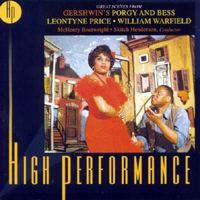 Studio Cast, 1963 (RCA)
Studio Cast, 1963 (RCA)  (5 / 5) There are many recordings of highlights from Porgy and Bess, but this one is exceptional for its superb singing, conducting, and sound quality. Opera diva Leontyne Price had one of the most beautiful voices of the 20th century. She toured in the role of Bess for two years (1952-54), and posterity should be grateful that she commercially recorded large portions of this score when she was in her vocal prime. Her Porgy on tour and on the album is William Warfield, to whom Price was briefly wed; the marriage may not have worked out, but they sure make beautiful music together, she with her glorious soprano and he with his warm baritone. Less successful is McHenry Boatwright, who brings a somewhat stuffy operatic sound to the role of the brutal Crown, but it’s great to have original Sportin’ Life John Bubbles on hand. Although his voice had weakened with age by the time of this recording, Bubbles still gives us style for miles. Price and Warfield also sing sections of the score that were written for other characters, but this compromise in faithfulness to the narrative is justified when we hear Price’s thrilling renditions of “Summertime” and “My Man’s Gone Now.” Skitch Henderson conducts with tremendous verve, and the technical quality of the recording is astoundingly good. Be sure to attenuate the volume control of your sound system during the orchestral postlude to “There’s a Boat That’s Leavin’ Soon for New York” if you don’t want to disturb your neighbors. (Fun bit of trivia: In the album’s final track, in the sung dialogue section leading into “I’m on My Way,” one of the supporting singers comes in late for her entrance with the line “It’s way up north, past the custom house” but the producers didn’t bother to do a retake.) — M.P.
(5 / 5) There are many recordings of highlights from Porgy and Bess, but this one is exceptional for its superb singing, conducting, and sound quality. Opera diva Leontyne Price had one of the most beautiful voices of the 20th century. She toured in the role of Bess for two years (1952-54), and posterity should be grateful that she commercially recorded large portions of this score when she was in her vocal prime. Her Porgy on tour and on the album is William Warfield, to whom Price was briefly wed; the marriage may not have worked out, but they sure make beautiful music together, she with her glorious soprano and he with his warm baritone. Less successful is McHenry Boatwright, who brings a somewhat stuffy operatic sound to the role of the brutal Crown, but it’s great to have original Sportin’ Life John Bubbles on hand. Although his voice had weakened with age by the time of this recording, Bubbles still gives us style for miles. Price and Warfield also sing sections of the score that were written for other characters, but this compromise in faithfulness to the narrative is justified when we hear Price’s thrilling renditions of “Summertime” and “My Man’s Gone Now.” Skitch Henderson conducts with tremendous verve, and the technical quality of the recording is astoundingly good. Be sure to attenuate the volume control of your sound system during the orchestral postlude to “There’s a Boat That’s Leavin’ Soon for New York” if you don’t want to disturb your neighbors. (Fun bit of trivia: In the album’s final track, in the sung dialogue section leading into “I’m on My Way,” one of the supporting singers comes in late for her entrance with the line “It’s way up north, past the custom house” but the producers didn’t bother to do a retake.) — M.P.
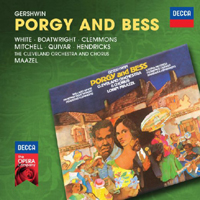 Studio Cast, 1976 (London, 3CDs)
Studio Cast, 1976 (London, 3CDs)  (4 / 5) For 40 years after the premiere of Porgy and Bess, no truly complete recording of the score was available. Then, two such recordings were released in 1976. This one features the first-rank conductor Lorin Maazel leading the Cleveland Orchestra. If some of his choices of tempo are a little eccentric, none of them are damaging, and the performance is very laudable overall. Willard White is a strong Porgy, if perhaps a bit too bass-sounding for some tastes, while Leona Mitchell is in fresh and beautiful voice as Bess. McHenry Boatwright, who was Crown on the 1963 recording, is back, and he sounds even stodgier here. But Barbara Hendricks as Clara, Florence Quivar as Serena, and Francois Clemmons as Sportin’ Life are very well suited to their roles, and the large chorus sounds fine even though it’s apparently not authentic in terms of racial makeup. The excellent quality of the recorded sound helps make this a full, rich, and exciting recording that probably would have achieved greater popularity if not for its having been bettered by the one reviewed immediately below. — M.P.
(4 / 5) For 40 years after the premiere of Porgy and Bess, no truly complete recording of the score was available. Then, two such recordings were released in 1976. This one features the first-rank conductor Lorin Maazel leading the Cleveland Orchestra. If some of his choices of tempo are a little eccentric, none of them are damaging, and the performance is very laudable overall. Willard White is a strong Porgy, if perhaps a bit too bass-sounding for some tastes, while Leona Mitchell is in fresh and beautiful voice as Bess. McHenry Boatwright, who was Crown on the 1963 recording, is back, and he sounds even stodgier here. But Barbara Hendricks as Clara, Florence Quivar as Serena, and Francois Clemmons as Sportin’ Life are very well suited to their roles, and the large chorus sounds fine even though it’s apparently not authentic in terms of racial makeup. The excellent quality of the recorded sound helps make this a full, rich, and exciting recording that probably would have achieved greater popularity if not for its having been bettered by the one reviewed immediately below. — M.P.
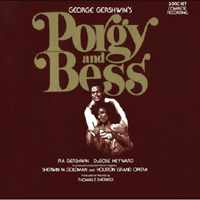 Houston Grand Opera Cast, 1976 (RCA, 3CDs)
Houston Grand Opera Cast, 1976 (RCA, 3CDs)  (5 / 5) A superb production of a great American work marked the country’s bicentennial when the Houston Grand Opera’s Porgy and Bess came to Broadway in 1976. Because this complete recording was based on an actual stage production (which was performed live with a fair amount of cuts), it has a palpable theatricality, and John DeMain’s conducting of the score is beyond criticism. The solo singers are generally excellent, if only definitive in one case: Larry Marshall is the best Sportin’ Life on records. Donnie Ray Albert displays a strong baritone as Porgy, but his voice may strike some listeners as a bit too darkly “operatic” for the part, and his sibilant esses are somewhat distracting. As Bess, Clamma Dale proves herself to be a great singing actress, and one of the sexiest-ever exponents of the role. The other singers on hand help to make this recording really special: Betty Lane offers an ethereally beautiful performance of “Summertime,” Wilma Shakesnider is immensely moving in Serena’s “My Man’s Gone Now,” Carol Brice’s Maria is a force to be reckoned with, and Andrew Smith has just the right voice for Crown. The large chorus and orchestra sound fabulous throughout. Although Albert’s Porgy is not quite all that we might wish it to be, this set still rates five stars because it’s by far the most satisfying of the three note-complete recordings of a true American masterwork. — M.P.
(5 / 5) A superb production of a great American work marked the country’s bicentennial when the Houston Grand Opera’s Porgy and Bess came to Broadway in 1976. Because this complete recording was based on an actual stage production (which was performed live with a fair amount of cuts), it has a palpable theatricality, and John DeMain’s conducting of the score is beyond criticism. The solo singers are generally excellent, if only definitive in one case: Larry Marshall is the best Sportin’ Life on records. Donnie Ray Albert displays a strong baritone as Porgy, but his voice may strike some listeners as a bit too darkly “operatic” for the part, and his sibilant esses are somewhat distracting. As Bess, Clamma Dale proves herself to be a great singing actress, and one of the sexiest-ever exponents of the role. The other singers on hand help to make this recording really special: Betty Lane offers an ethereally beautiful performance of “Summertime,” Wilma Shakesnider is immensely moving in Serena’s “My Man’s Gone Now,” Carol Brice’s Maria is a force to be reckoned with, and Andrew Smith has just the right voice for Crown. The large chorus and orchestra sound fabulous throughout. Although Albert’s Porgy is not quite all that we might wish it to be, this set still rates five stars because it’s by far the most satisfying of the three note-complete recordings of a true American masterwork. — M.P.
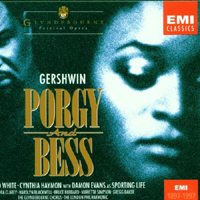 Studio Cast, 1989 (EMI, 3CDs)
Studio Cast, 1989 (EMI, 3CDs)  (1 / 5) What might have been an estimable recording of a Glyndebourne Festival Opera production of Porgy and Bess is largely undone by Simon Rattle, whose work here comes across as that of a conductor more interested in calling attention to his presence at the podium than interpreting this work according to the composer’s intentions. Several of the tempi that Rattle sets for the London Symphony Orchestra are ridiculously fast, others are absurdly slow, and there is no sense of dramatic cohesion throughout the opera. That’s unfortunate, because the singers are strong: Willard White is back as Porgy, sounding even better than before, and he’s superbly partnered by the Bess of Cynthia Haymon. Also happily on hand are Gregg Baker as the sexiest Crown imaginable, Damon Evans as a slick, very well-sung Sportin’ Life, and Harolyn Blackwell as a pure-toned Clara. After the fact, this recording served as the soundtrack for a 1993 video version of Porgy and Bess that’s deplorable not only because it’s so badly lip-synched, misdirected, and poorly conducted, but also because it was apparently sanctioned by the Gershwin estate in lieu of a TV telecast of the contemporaneous Metropolitan Opera production. — M.P.
(1 / 5) What might have been an estimable recording of a Glyndebourne Festival Opera production of Porgy and Bess is largely undone by Simon Rattle, whose work here comes across as that of a conductor more interested in calling attention to his presence at the podium than interpreting this work according to the composer’s intentions. Several of the tempi that Rattle sets for the London Symphony Orchestra are ridiculously fast, others are absurdly slow, and there is no sense of dramatic cohesion throughout the opera. That’s unfortunate, because the singers are strong: Willard White is back as Porgy, sounding even better than before, and he’s superbly partnered by the Bess of Cynthia Haymon. Also happily on hand are Gregg Baker as the sexiest Crown imaginable, Damon Evans as a slick, very well-sung Sportin’ Life, and Harolyn Blackwell as a pure-toned Clara. After the fact, this recording served as the soundtrack for a 1993 video version of Porgy and Bess that’s deplorable not only because it’s so badly lip-synched, misdirected, and poorly conducted, but also because it was apparently sanctioned by the Gershwin estate in lieu of a TV telecast of the contemporaneous Metropolitan Opera production. — M.P.
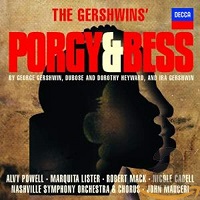 Nashville Symphony Concert Cast, 2006 (Decca, 2CDs)
Nashville Symphony Concert Cast, 2006 (Decca, 2CDs)  (3 / 5) A major impetus for the Nashville Symphony’s 2006 concert performances of Porgy and Bess, and this subsequent recording, was to present the score as heard in the original Broadway production, with cuts that were sanctioned by the composer, rather than with excisions (and restorations) made by others over the decades. The issue here is that some of the cuts made for Broadway were approved by Gershwin only with reluctance, to reduce the sheer length of the massive work and because he realized that the full-length title role would be basically unsingable for eight performances a week. Also, some of the edits here seem to have been done after recording, and by no means seamlessly. At any rate, the cuts are what they are, and the performance overall is creditable if nothing special. Mauceri has done a lot of American musical theater as well as opera, so his reading of the score is somewhat more effective than Simon Rattle’s or Nikolaus Harnoncourt’s, but nowhere near as assured as Lehman Engel’s, Skitch Henderson’s, or John DeMain’s. The cast is strong across the board, headed by the excellent Alvy Powell and Marquita Lister, who had previously appeared together as the title couple in performances at the New York City Opera. — M.P.
(3 / 5) A major impetus for the Nashville Symphony’s 2006 concert performances of Porgy and Bess, and this subsequent recording, was to present the score as heard in the original Broadway production, with cuts that were sanctioned by the composer, rather than with excisions (and restorations) made by others over the decades. The issue here is that some of the cuts made for Broadway were approved by Gershwin only with reluctance, to reduce the sheer length of the massive work and because he realized that the full-length title role would be basically unsingable for eight performances a week. Also, some of the edits here seem to have been done after recording, and by no means seamlessly. At any rate, the cuts are what they are, and the performance overall is creditable if nothing special. Mauceri has done a lot of American musical theater as well as opera, so his reading of the score is somewhat more effective than Simon Rattle’s or Nikolaus Harnoncourt’s, but nowhere near as assured as Lehman Engel’s, Skitch Henderson’s, or John DeMain’s. The cast is strong across the board, headed by the excellent Alvy Powell and Marquita Lister, who had previously appeared together as the title couple in performances at the New York City Opera. — M.P.
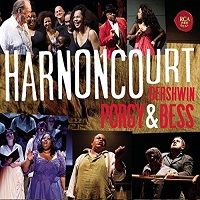 Styriarte Festival Cast, 2009 (Sony Music-RCA Red Seal, 3CDs)
Styriarte Festival Cast, 2009 (Sony Music-RCA Red Seal, 3CDs)  (2 / 5) The packaging of this recording makes it clear who’s intended to be its main focus: Nikolaus Harnoncourt, an Austrian conductor known for his historically informed performances of music primarily from the Classical and pre-Classical eras, which predate the time of the composition of Porgy and Bess by a great many years. Here, he leads the soloists, the Chamber Orchestra of Europe, and the Arnold Schoenberg Choir (?!) in a live performance that has many moments of ineffable beauty and great power when heard in isolation. But sadly, much of the musical direction and choral singing is overly precious, and the movement of the drama is so lugubrious that the whole is lesser than the sum of its parts. Contributing to this problem is the fact that bass-baritone Jonathan Lemalli as Porgy has a sound so dark and cavernous in tone that he’s unable to bring any lighter vocal or emotional colors to the role, and the weight of his voice sometimes drags down the pitch. Faring somewhat better is Isabelle Kabatu as Bess, but she also sounds a bit too “operatic,” and her diction is wanting. (Both leads occasionally display obvious non-American accents, particular in some of their spoke-sung lines.) As for the rest of the cast, while Michael Forest’s Sportin’ Life is plagued by an unfortunate wobble, it’s great to hear Roberta Alexander — once famous as a lyric soprano — in the character mezzo role of Maria, and to have Gregg Baker back as Crown years after his triumphs in the role in several previous presentations of this work, including the 1983 Broadway run and the 1989 Glyndebourne Festival Opera production that yielded the Simon Rattle recording. (Note: For these performances, Harnoncourt edited the score to more or less accord with what was originally performed on Broadway in 1935, but a major, historically significant restoration is the unique “Symphony of Noise,” played by the percussionists at the start of the final scene. ) — M.P.
(2 / 5) The packaging of this recording makes it clear who’s intended to be its main focus: Nikolaus Harnoncourt, an Austrian conductor known for his historically informed performances of music primarily from the Classical and pre-Classical eras, which predate the time of the composition of Porgy and Bess by a great many years. Here, he leads the soloists, the Chamber Orchestra of Europe, and the Arnold Schoenberg Choir (?!) in a live performance that has many moments of ineffable beauty and great power when heard in isolation. But sadly, much of the musical direction and choral singing is overly precious, and the movement of the drama is so lugubrious that the whole is lesser than the sum of its parts. Contributing to this problem is the fact that bass-baritone Jonathan Lemalli as Porgy has a sound so dark and cavernous in tone that he’s unable to bring any lighter vocal or emotional colors to the role, and the weight of his voice sometimes drags down the pitch. Faring somewhat better is Isabelle Kabatu as Bess, but she also sounds a bit too “operatic,” and her diction is wanting. (Both leads occasionally display obvious non-American accents, particular in some of their spoke-sung lines.) As for the rest of the cast, while Michael Forest’s Sportin’ Life is plagued by an unfortunate wobble, it’s great to hear Roberta Alexander — once famous as a lyric soprano — in the character mezzo role of Maria, and to have Gregg Baker back as Crown years after his triumphs in the role in several previous presentations of this work, including the 1983 Broadway run and the 1989 Glyndebourne Festival Opera production that yielded the Simon Rattle recording. (Note: For these performances, Harnoncourt edited the score to more or less accord with what was originally performed on Broadway in 1935, but a major, historically significant restoration is the unique “Symphony of Noise,” played by the percussionists at the start of the final scene. ) — M.P.
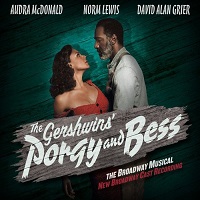 Broadway Cast, 2012 (PS Classics, 2CDs) No stars; not recommended. The high-handed use of the inaccurate title The Gershwins’ Porgy and Bess for this production, with the annoying subtitle “The Broadway Musical,” is only the beginning of its problems. (In a nutshell, and for the record: DuBose Heyward wrote the vast majority of the original work’s libretto to George Gershwin’s music, with Ira Gershwin collaborating only as far as penning a very small percentage of the lyrics himself, apparently including Sportin’ Life’s songs, and polishing others.) On the other hand, in a sense, this isn’t a re-titling of what used to be known in all of its various versions as Porgy and Bess, but rather a still-incorrect label for a radical revision of the piece that has resulted in a foul concoction. What has been done to the score here in terms of editing, rearrangements, re-orchestrations, and transpositions to make it more of a “musical” than an opera is well-nigh criminal, and believe it or not, there are actually rewrites of a few of the lyrics — some with a nod toward “political correctness,” others for who knows what reasons. If the great musical theater singer Audra McDonald had trained and developed her voice in the operatic sphere, she might have been a Bess for the ages, but here she’s done in by all of that futzing with the music, as well as by an overly dark and inward misconception of the character. Norm Lewis has displayed his gorgeous, warm, pop-tinged baritenor to great advantage is many musical theater roles, but he’s over-parted as Porgy; in “I Got Plenty of Nothing,” as it’s titled here, he has to keep switching octaves because not all of the notes as written are in his range, even with modulations of key within the song. Some of the other cast members, notably Phillip Boykin as Crown and David Alan Grier as Sportin’ Life — here, “Sporting Life” — somehow manage to emerge from this debacle relatively unscathed, but the minuses of the recording so greatly outweigh the pluses that, in sum, it can’t be recommended for listening. — M.P.
Broadway Cast, 2012 (PS Classics, 2CDs) No stars; not recommended. The high-handed use of the inaccurate title The Gershwins’ Porgy and Bess for this production, with the annoying subtitle “The Broadway Musical,” is only the beginning of its problems. (In a nutshell, and for the record: DuBose Heyward wrote the vast majority of the original work’s libretto to George Gershwin’s music, with Ira Gershwin collaborating only as far as penning a very small percentage of the lyrics himself, apparently including Sportin’ Life’s songs, and polishing others.) On the other hand, in a sense, this isn’t a re-titling of what used to be known in all of its various versions as Porgy and Bess, but rather a still-incorrect label for a radical revision of the piece that has resulted in a foul concoction. What has been done to the score here in terms of editing, rearrangements, re-orchestrations, and transpositions to make it more of a “musical” than an opera is well-nigh criminal, and believe it or not, there are actually rewrites of a few of the lyrics — some with a nod toward “political correctness,” others for who knows what reasons. If the great musical theater singer Audra McDonald had trained and developed her voice in the operatic sphere, she might have been a Bess for the ages, but here she’s done in by all of that futzing with the music, as well as by an overly dark and inward misconception of the character. Norm Lewis has displayed his gorgeous, warm, pop-tinged baritenor to great advantage is many musical theater roles, but he’s over-parted as Porgy; in “I Got Plenty of Nothing,” as it’s titled here, he has to keep switching octaves because not all of the notes as written are in his range, even with modulations of key within the song. Some of the other cast members, notably Phillip Boykin as Crown and David Alan Grier as Sportin’ Life — here, “Sporting Life” — somehow manage to emerge from this debacle relatively unscathed, but the minuses of the recording so greatly outweigh the pluses that, in sum, it can’t be recommended for listening. — M.P.
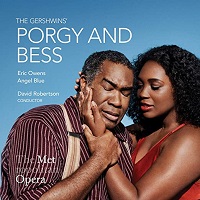 Metropolitan Opera Cast, 2020 (Metropolitan Opera, 3CDs)
Metropolitan Opera Cast, 2020 (Metropolitan Opera, 3CDs)  (4 / 5) When Porgy and Bess was created in the mid 1930s, there were discussions about having the world premiere presented by the Metropolitan Opera. That didn’t happen, largely for logistical reasons, including the fact that the Met would have had to engage an entirely new company of black singers. So the work was first produced on Broadway, as noted above. The Met didn’t get around to this American masterpiece until 1985, with a production that starred Simon Estes and Grace Bumbry — and, yes, with most of the rest of the company jobbed in. That production was granted no official audio or video recording, but the Met’s new production in 2019 has been well documented in both media; here is an audio recording, drawn from two live performances at the Met, that’s quite satisfying overall. Eric Owens is a solid if rather stolid and occasionally tired-sounding Porgy, lacking somewhat in energy and personality as compared to his recorded predecessors in the role, but still largely pleasurable to hear for his warm, ample baritone. Closer to ideal is Angel Blue’s vocally resplendent and dramatically vital Bess, missing only perhaps a little bit of passion in the character’s more desperate moments. Standouts among the remainder of the cast are Latonia Moore as Serena, Golda Schultz as Clara, Alfred Walker as Crown, Frederick Ballentine as Sportin’ Life, and the veteran, star mezzo Denyce Graves as Maria. The Met’s world-class orchestra is skillfully conducted by David Robertson with a full grasp of the work’s proper style. Although there were significant cuts in the gargantuan score for this production — as compared to the Met’s first P&B, which was presented virtually complete — the recording still spreads over three 3CDs. — M.P.
(4 / 5) When Porgy and Bess was created in the mid 1930s, there were discussions about having the world premiere presented by the Metropolitan Opera. That didn’t happen, largely for logistical reasons, including the fact that the Met would have had to engage an entirely new company of black singers. So the work was first produced on Broadway, as noted above. The Met didn’t get around to this American masterpiece until 1985, with a production that starred Simon Estes and Grace Bumbry — and, yes, with most of the rest of the company jobbed in. That production was granted no official audio or video recording, but the Met’s new production in 2019 has been well documented in both media; here is an audio recording, drawn from two live performances at the Met, that’s quite satisfying overall. Eric Owens is a solid if rather stolid and occasionally tired-sounding Porgy, lacking somewhat in energy and personality as compared to his recorded predecessors in the role, but still largely pleasurable to hear for his warm, ample baritone. Closer to ideal is Angel Blue’s vocally resplendent and dramatically vital Bess, missing only perhaps a little bit of passion in the character’s more desperate moments. Standouts among the remainder of the cast are Latonia Moore as Serena, Golda Schultz as Clara, Alfred Walker as Crown, Frederick Ballentine as Sportin’ Life, and the veteran, star mezzo Denyce Graves as Maria. The Met’s world-class orchestra is skillfully conducted by David Robertson with a full grasp of the work’s proper style. Although there were significant cuts in the gargantuan score for this production — as compared to the Met’s first P&B, which was presented virtually complete — the recording still spreads over three 3CDs. — M.P.
Play On!
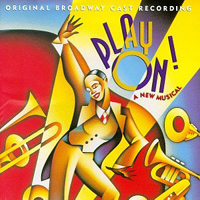 Original Broadway Cast, 1997 (Varèse Sarabande)
Original Broadway Cast, 1997 (Varèse Sarabande)  (5 / 5) Play On! was at least the fourth musical adapted from Shakespeare’s Twelfth Night to play, albeit briefly, in New York. This version moved the action to Harlem, circa the 1940s. The noble Count Orsino of the original became the greatest jazzman of his time, a composer and bandleader named “the Duke” — and if there’s any doubt as to who inspired the character, the musical’s songs were all taken from the catalog of Duke Ellington. The trouble with the show is that, even though the songs make dramatic sense as slotted, the book writing is deadly. But what you’ll find on the recording is one terrific Ellington song after another, gorgeously arranged by Luther Henderson. There are famous titles — “Take the ‘A’ Train,” “Don’t Get Around Much Anymore” — and others not-so-famous, such as “Hit Me With a Hot Note and Watch Me Bounce.” All of them are wonderfully performed by Tonya Pinkins, Cheryl Freeman, Carl Anderson, Lawrence Hamilton, André De Shields, and Larry Marshall. — David Wolf
(5 / 5) Play On! was at least the fourth musical adapted from Shakespeare’s Twelfth Night to play, albeit briefly, in New York. This version moved the action to Harlem, circa the 1940s. The noble Count Orsino of the original became the greatest jazzman of his time, a composer and bandleader named “the Duke” — and if there’s any doubt as to who inspired the character, the musical’s songs were all taken from the catalog of Duke Ellington. The trouble with the show is that, even though the songs make dramatic sense as slotted, the book writing is deadly. But what you’ll find on the recording is one terrific Ellington song after another, gorgeously arranged by Luther Henderson. There are famous titles — “Take the ‘A’ Train,” “Don’t Get Around Much Anymore” — and others not-so-famous, such as “Hit Me With a Hot Note and Watch Me Bounce.” All of them are wonderfully performed by Tonya Pinkins, Cheryl Freeman, Carl Anderson, Lawrence Hamilton, André De Shields, and Larry Marshall. — David Wolf
Plain and Fancy
 Original Broadway Cast, 1955 (Capitol/DRG)
Original Broadway Cast, 1955 (Capitol/DRG)  (4 / 5) Listening to a second-rank score, a longtime musical theater lover will marvel at how often just-above-par tuners were a dependable source for Hit Parade clicks. “Young and Foolish,” sung here by David Daniels and Gloria Marlowe, was a major chart-buster thanks to teens of the 1950s, who were becoming the largest segment of the 45-rpm record-buying public. But “It Wonders Me,” “Plain We Live,” and “It’s a Helluva Way to Run a Love Affair” also turned up on the airwaves and in nightclubs — to the gratification, surely, of composer Albert Hague and lyricist Arnold B. Horwitt. Another big number, “This Is All Very New to Me,” is interpreted by the wonderful Barbara Cook on this cast album. The plot, hardly the stuff of great dramatic literature, concerns a couple of Manhattan so-so sophisticates who wander to Bird-in-Hand, Pennsylvania and get mixed up in the restrained romantic entanglements of some stage-quaint Amish folks. The cast boasts a number of accomplished vocalists. Shirl Conway, with her astringent approach to a comic ditty, nails “It’s a Helluva Way …” to the back wall. Cook, whose soaring tones are never flowery (as opposed to Marlowe’s), shows up enthusiastically in the forefront of three songs. Lively Nancy Andrews takes the lead in “Plenty of Pennsylvania” and in the very cute “City Mouse, Country Mouse.” Franz Allers conducts impeccably. — David Finkle
(4 / 5) Listening to a second-rank score, a longtime musical theater lover will marvel at how often just-above-par tuners were a dependable source for Hit Parade clicks. “Young and Foolish,” sung here by David Daniels and Gloria Marlowe, was a major chart-buster thanks to teens of the 1950s, who were becoming the largest segment of the 45-rpm record-buying public. But “It Wonders Me,” “Plain We Live,” and “It’s a Helluva Way to Run a Love Affair” also turned up on the airwaves and in nightclubs — to the gratification, surely, of composer Albert Hague and lyricist Arnold B. Horwitt. Another big number, “This Is All Very New to Me,” is interpreted by the wonderful Barbara Cook on this cast album. The plot, hardly the stuff of great dramatic literature, concerns a couple of Manhattan so-so sophisticates who wander to Bird-in-Hand, Pennsylvania and get mixed up in the restrained romantic entanglements of some stage-quaint Amish folks. The cast boasts a number of accomplished vocalists. Shirl Conway, with her astringent approach to a comic ditty, nails “It’s a Helluva Way …” to the back wall. Cook, whose soaring tones are never flowery (as opposed to Marlowe’s), shows up enthusiastically in the forefront of three songs. Lively Nancy Andrews takes the lead in “Plenty of Pennsylvania” and in the very cute “City Mouse, Country Mouse.” Franz Allers conducts impeccably. — David Finkle
Pippin
 Original Broadway Cast, 1972 (Motown/Decca)
Original Broadway Cast, 1972 (Motown/Decca)  (3 / 5) Stephen Schwartz wrote the score for this hippy-dippy medieval musical. John Rubinstein starred as the son of Charlemagne, roaming the Holy Roman Empire looking for the meaning of life and instead finding war, sex, patricide, and — finally! — the love of a good woman. The oddball story was all-that-jazzed up by Bob Fosse, whose sexy, inventive staging made the show one of the biggest hits of the decade. Even with a fundamentally weak concept, there’s much to like here, starting with the unique, folk-jazz sound of the score. “Magic to Do,” led by narrator/emcee Ben Vereen, is the definitive band-of-strolling-players opening number; and Pippin’s first solo, “Corner of the Sky,” is a stirring piece of writing. Also hard to resist is that paean to pagan joys “No Time At All,” which provided veteran trouper Irene Ryan with her career sign-off. A very young Jill Clayburgh offers a lovely reading of the clear-eyed ballad “I Guess I’ll Miss the Man,” and Vereen and Rubinsten demonstrate split-second timing in the duet “On the Right Track.” The pure 1970s soft-pop orchestrations are, surprisingly, by Ralph Burns, who apparently could work in just about any style. As a result, this is one of the most intimate-sounding of all Broadway albums. — David Barbour
(3 / 5) Stephen Schwartz wrote the score for this hippy-dippy medieval musical. John Rubinstein starred as the son of Charlemagne, roaming the Holy Roman Empire looking for the meaning of life and instead finding war, sex, patricide, and — finally! — the love of a good woman. The oddball story was all-that-jazzed up by Bob Fosse, whose sexy, inventive staging made the show one of the biggest hits of the decade. Even with a fundamentally weak concept, there’s much to like here, starting with the unique, folk-jazz sound of the score. “Magic to Do,” led by narrator/emcee Ben Vereen, is the definitive band-of-strolling-players opening number; and Pippin’s first solo, “Corner of the Sky,” is a stirring piece of writing. Also hard to resist is that paean to pagan joys “No Time At All,” which provided veteran trouper Irene Ryan with her career sign-off. A very young Jill Clayburgh offers a lovely reading of the clear-eyed ballad “I Guess I’ll Miss the Man,” and Vereen and Rubinsten demonstrate split-second timing in the duet “On the Right Track.” The pure 1970s soft-pop orchestrations are, surprisingly, by Ralph Burns, who apparently could work in just about any style. As a result, this is one of the most intimate-sounding of all Broadway albums. — David Barbour
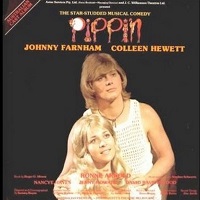 Australian Cast, 1974 (EMI/no CD)
Australian Cast, 1974 (EMI/no CD)  (2 / 5) This recording doesn’t start off all that well, as both Ronne Arnold in the role of the Leading Player and the ensemble sound a little pitch-shy at moments in “Magic to Do.” Indeed, the members of the ensemble don’t sing as well throughout as did their counterparts on the original Broadway cast album; note, for example, how the gorgeous harmonies in the climactic section of “Glory” have been completely eliminated here. Despite a few moments of strain, Johnny Farnham as Pippin displays a strong, youthful-sounding voice that’s mostly very enjoyable in his solos, nearly all of which are sung in higher keys than the originals. David Ravenswood is a properly pompous Charlemagne, but whatever personality Jenny Howard brings to Berthe’s song “No Time at All” doesn’t compensate for her trouble matching pitches. Catherine Hewett performs “I Guess I’ll Miss the Man” with lots of emotion, and she sounds lovely when harmonizing with Farnham in “Love Song.” The finale cut here is notable for including a reprise of the “Think about the sun, Pippin” chorus after Pippin’s epiphany (“I’m not a river or a giant bird”), which certainly doesn’t fit in with the ending of the show as originally directed by Bob Fosse. (Perhaps this was the curtain call music?) — Michael Portantiere
(2 / 5) This recording doesn’t start off all that well, as both Ronne Arnold in the role of the Leading Player and the ensemble sound a little pitch-shy at moments in “Magic to Do.” Indeed, the members of the ensemble don’t sing as well throughout as did their counterparts on the original Broadway cast album; note, for example, how the gorgeous harmonies in the climactic section of “Glory” have been completely eliminated here. Despite a few moments of strain, Johnny Farnham as Pippin displays a strong, youthful-sounding voice that’s mostly very enjoyable in his solos, nearly all of which are sung in higher keys than the originals. David Ravenswood is a properly pompous Charlemagne, but whatever personality Jenny Howard brings to Berthe’s song “No Time at All” doesn’t compensate for her trouble matching pitches. Catherine Hewett performs “I Guess I’ll Miss the Man” with lots of emotion, and she sounds lovely when harmonizing with Farnham in “Love Song.” The finale cut here is notable for including a reprise of the “Think about the sun, Pippin” chorus after Pippin’s epiphany (“I’m not a river or a giant bird”), which certainly doesn’t fit in with the ending of the show as originally directed by Bob Fosse. (Perhaps this was the curtain call music?) — Michael Portantiere
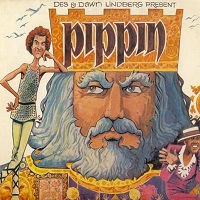 South African Cast, 1975 (Bell/no CD)
South African Cast, 1975 (Bell/no CD)  (3 / 5) Sammy Brown as the Leading Player displays a singing voice similar in style, timbre, power, and control to Ben Vereen’s, which of course is meant as a compliment. Hal Watters as Pippin sounds lovely and persuasive in the ballads, and he also possesses the vocal goods for the musical/emotional climaxes of Stephen Schwartz’s great songs. Jo-Ann Pezarro as Fastrada has a lot of fun with “Spread a Little Sunshine,” and if Bess Finney as Berthe is not quite a match for Broadway’s Irene Ryan when it comes to sheer joie de vivre and comic brio, she sings a lot more of “No Time at All” — and hits a lot more of the notes on pitch — than did Jenny Howard of Australia. The choral work is solid throughout the album, and the orchestrations sound great as recorded here; they are the originals for the most part, but note the cool harpsichord effect at the beginning of “I Guess I’ll Miss the Man,” sung persuasively by Andre Hattingh. — M.P.
(3 / 5) Sammy Brown as the Leading Player displays a singing voice similar in style, timbre, power, and control to Ben Vereen’s, which of course is meant as a compliment. Hal Watters as Pippin sounds lovely and persuasive in the ballads, and he also possesses the vocal goods for the musical/emotional climaxes of Stephen Schwartz’s great songs. Jo-Ann Pezarro as Fastrada has a lot of fun with “Spread a Little Sunshine,” and if Bess Finney as Berthe is not quite a match for Broadway’s Irene Ryan when it comes to sheer joie de vivre and comic brio, she sings a lot more of “No Time at All” — and hits a lot more of the notes on pitch — than did Jenny Howard of Australia. The choral work is solid throughout the album, and the orchestrations sound great as recorded here; they are the originals for the most part, but note the cool harpsichord effect at the beginning of “I Guess I’ll Miss the Man,” sung persuasively by Andre Hattingh. — M.P.
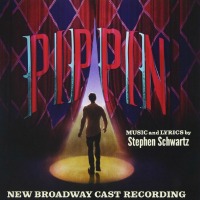 Broadway Cast, 2013 (Ghostlight)
Broadway Cast, 2013 (Ghostlight)  (3 / 5) Removing Bob Fosse’s staging from Pippin necessarily created a vacuum that Diane Paulus, this revival’s director, filled with a whole lot of everything: magic acts, acrobats, circus performers, and brassier new orchestrations by Larry Hochman. You may miss the imperturbable cool of the original recording, but this one has its compensations, beginning with Patina Miller, whose sassy, high-energy Leading Player is a constant delight. Matthew James Thomas’s Pippin is even better sung than John Rubinstein’s original, Terrence Mann amusingly captures Charlemagne’s fat-headed pomposity (even in “War is a Science,” still the show’s weakest number), and Rachel Bay Jones gives a charming, screwball spin to Catherine (the Jill Clayburgh role). In a class by herself is Andrea Martin; her recorded performance of “No Time at All” is necessarily missing the acrobatic turn that brought audiences to their feet in mid-number, but her warm, bigger-than-life persona comes through loud and clear. As Fastrada, the villain of the piece, Charlotte D’Amboise was sly and stylish on stage, but on the album she seems to be trying a little too hard. There are some changes in the lyrics of a few songs, and this recording of the score is more expansive than its predecessor; the scorching sex ballet that follows the sweet ballad “With You” is included here, and there’s also an entr’acte, which the intermissionless original production never had. — D.B.
(3 / 5) Removing Bob Fosse’s staging from Pippin necessarily created a vacuum that Diane Paulus, this revival’s director, filled with a whole lot of everything: magic acts, acrobats, circus performers, and brassier new orchestrations by Larry Hochman. You may miss the imperturbable cool of the original recording, but this one has its compensations, beginning with Patina Miller, whose sassy, high-energy Leading Player is a constant delight. Matthew James Thomas’s Pippin is even better sung than John Rubinstein’s original, Terrence Mann amusingly captures Charlemagne’s fat-headed pomposity (even in “War is a Science,” still the show’s weakest number), and Rachel Bay Jones gives a charming, screwball spin to Catherine (the Jill Clayburgh role). In a class by herself is Andrea Martin; her recorded performance of “No Time at All” is necessarily missing the acrobatic turn that brought audiences to their feet in mid-number, but her warm, bigger-than-life persona comes through loud and clear. As Fastrada, the villain of the piece, Charlotte D’Amboise was sly and stylish on stage, but on the album she seems to be trying a little too hard. There are some changes in the lyrics of a few songs, and this recording of the score is more expansive than its predecessor; the scorching sex ballet that follows the sweet ballad “With You” is included here, and there’s also an entr’acte, which the intermissionless original production never had. — D.B.
Pipe Dream
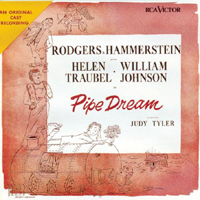 Original Broadway Cast, 1955 (RCA)
Original Broadway Cast, 1955 (RCA)  (3 / 5) Rodgers and Hammerstein may not have been the ideal team to put the chippies and layabouts of John Steinbeck’s Cannery Row onstage in a musical; it’s tantalizing to consider what Frank Loesser, who was first approached to adapt Steinbeck’s Sweet Thursday, would have wrought. Still, the score of the shortest-running R&H Broadway show is lovely, full of Oscar Hammerstein’s humanity and Richard Rodgers’ surprising melodic turns. Listen to the composer’s wondrous harmonics in “Suzy Is a Good Thing,” for example. Evidently, Helen Traubel’s whorehouse madam failed to convince in the theater, but she’s fine on disc. Even better are the young lovers, the soulful Judy Tyler and the always reliable William Johnson, genuinely sexy together and apart. As for the choral ensembles, they’re lively and lusty. The overture is incomplete here; the second verses of each song, even the excellent “The Man I Used to Be,” are missing; and the album is capped by an illogical finale that crams as many hopeful hits as possible into a few minutes. But the recording is valuable as an aural document of the original production of a rare flop from a team that was much more used to great success. — Marc Miller
(3 / 5) Rodgers and Hammerstein may not have been the ideal team to put the chippies and layabouts of John Steinbeck’s Cannery Row onstage in a musical; it’s tantalizing to consider what Frank Loesser, who was first approached to adapt Steinbeck’s Sweet Thursday, would have wrought. Still, the score of the shortest-running R&H Broadway show is lovely, full of Oscar Hammerstein’s humanity and Richard Rodgers’ surprising melodic turns. Listen to the composer’s wondrous harmonics in “Suzy Is a Good Thing,” for example. Evidently, Helen Traubel’s whorehouse madam failed to convince in the theater, but she’s fine on disc. Even better are the young lovers, the soulful Judy Tyler and the always reliable William Johnson, genuinely sexy together and apart. As for the choral ensembles, they’re lively and lusty. The overture is incomplete here; the second verses of each song, even the excellent “The Man I Used to Be,” are missing; and the album is capped by an illogical finale that crams as many hopeful hits as possible into a few minutes. But the recording is valuable as an aural document of the original production of a rare flop from a team that was much more used to great success. — Marc Miller
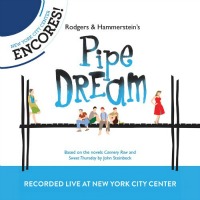 Encores! Cast, 2012 (Ghostlight)
Encores! Cast, 2012 (Ghostlight)  (3 / 5) The New York City Center Encores! series had a surprising go at Pipe Dream in 2012, and this nearly note-complete recording (it’s missing the “Witches’ Chorus”) is the happy result. In a major bit of rethought casting, Leslie Uggams is Fauna, and if you can accept how different she is from the operatic Helen Traubel, you’ll appreciate the warmth and humor she brings to the part. While Laura Osnes lacks Judy Tyler’s spectacular low notes, she fully inhabits the self-doubt, sass, and self-discovery that reside in Suzy. Will Chase’s Doc is a little callow, but well sung; the role of Mac fits Tom Wopat like a comfy pair of overalls; and Stephen Kallem nails Hazel. Drawn from sections of several performances recorded before not particularly enthusiastic live audiences during the show’s brief Encores! run, the album is sonically excellent and gratifyingly thorough as compared to RCA’s original Broadway cast album, which is notably stingy on second verses, musical scenes, and John Morris’s sensational dance music. More intimate than most R&H, Pipe Dream is nicely represented here, and the material is revealed to be earthier than Hammerstein is generally given credit for. — M.M.
(3 / 5) The New York City Center Encores! series had a surprising go at Pipe Dream in 2012, and this nearly note-complete recording (it’s missing the “Witches’ Chorus”) is the happy result. In a major bit of rethought casting, Leslie Uggams is Fauna, and if you can accept how different she is from the operatic Helen Traubel, you’ll appreciate the warmth and humor she brings to the part. While Laura Osnes lacks Judy Tyler’s spectacular low notes, she fully inhabits the self-doubt, sass, and self-discovery that reside in Suzy. Will Chase’s Doc is a little callow, but well sung; the role of Mac fits Tom Wopat like a comfy pair of overalls; and Stephen Kallem nails Hazel. Drawn from sections of several performances recorded before not particularly enthusiastic live audiences during the show’s brief Encores! run, the album is sonically excellent and gratifyingly thorough as compared to RCA’s original Broadway cast album, which is notably stingy on second verses, musical scenes, and John Morris’s sensational dance music. More intimate than most R&H, Pipe Dream is nicely represented here, and the material is revealed to be earthier than Hammerstein is generally given credit for. — M.M.
Pins and Needles
 Studio Cast, 1962 (Columbia/Sony)
Studio Cast, 1962 (Columbia/Sony)  (3 / 5) This 1930s topical revue is legendary for its original cast of talented shop workers from the International Ladies’ Garment Workers Union. Featuring songs by Harold Rome and sketches by Marc Blitzstein (among others), Pins and Needles wore its pro-labor, pro-union bias on its sleeve. But, in a bid for popularity, the writers pulled their punches. What began as mild political satire became anodyne as, over the course of a three-year run, new material — some of it by John Latouche — was interpolated. The show began performances in 1936 at the Labor Stage, but didn’t open officially until 1937. It later moved uptown, spawned a national tour, and ultimately was seen by more than a million theatergoers in New York and on the road. With a run of 1,108 performances, it held the longevity record for Broadway musicals prior to Oklahoma! This recording, made to commemorate the revue’s silver anniversary, saved Rome’s perky ditties from being lost (as were many of the show’s sketches), and has ensured that Pins and Needles is one of the few early Broadway revues known for its entire score rather than just for the odd “standard.” The music, originally arranged for two pianos, is played here on piano, guitar, bass, and drums under the direction of Stan Freeman. The vocalists — including Rome himself, Jack Carroll, Rose Marie Jun, Alan Sokoloff, and the 20-year-old Barbra Streisand — are very engaging. The charm of numbers such as “Sing Me a Song of Social Significance,” “Not Cricket to Picket,” and “Doing the Reactionary” compensates for the recording’s audio flaws. — Charles Wright
(3 / 5) This 1930s topical revue is legendary for its original cast of talented shop workers from the International Ladies’ Garment Workers Union. Featuring songs by Harold Rome and sketches by Marc Blitzstein (among others), Pins and Needles wore its pro-labor, pro-union bias on its sleeve. But, in a bid for popularity, the writers pulled their punches. What began as mild political satire became anodyne as, over the course of a three-year run, new material — some of it by John Latouche — was interpolated. The show began performances in 1936 at the Labor Stage, but didn’t open officially until 1937. It later moved uptown, spawned a national tour, and ultimately was seen by more than a million theatergoers in New York and on the road. With a run of 1,108 performances, it held the longevity record for Broadway musicals prior to Oklahoma! This recording, made to commemorate the revue’s silver anniversary, saved Rome’s perky ditties from being lost (as were many of the show’s sketches), and has ensured that Pins and Needles is one of the few early Broadway revues known for its entire score rather than just for the odd “standard.” The music, originally arranged for two pianos, is played here on piano, guitar, bass, and drums under the direction of Stan Freeman. The vocalists — including Rome himself, Jack Carroll, Rose Marie Jun, Alan Sokoloff, and the 20-year-old Barbra Streisand — are very engaging. The charm of numbers such as “Sing Me a Song of Social Significance,” “Not Cricket to Picket,” and “Doing the Reactionary” compensates for the recording’s audio flaws. — Charles Wright
Piano Bar
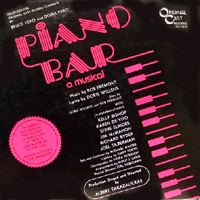 Original Off-Broadway Cast, 1978 (Original Cast Records/no CD) No stars; not recommended. Time was when you could buy an original cast recording with a reasonable amount of confidence. If a score got recorded, it usually meant that it was a work of some quality. Not so here. Piano Bar is a musical that takes place in — well, a piano bar. It throws together four strangers who sing about their pasts, their hopes, and their despair. The paper-thin characters and their petty problems are of extremely limited interest. Doris Willens’ weak lyrics are predictable and undramatic, while Rob Fremont’s music is simply monotonous. The high-powered cast features Kelly Bishop, Karen DeVito, Steve Elmore, Richard Ryder, and Joel Silberman (as the piano player), all for naught. — David Wolf
Original Off-Broadway Cast, 1978 (Original Cast Records/no CD) No stars; not recommended. Time was when you could buy an original cast recording with a reasonable amount of confidence. If a score got recorded, it usually meant that it was a work of some quality. Not so here. Piano Bar is a musical that takes place in — well, a piano bar. It throws together four strangers who sing about their pasts, their hopes, and their despair. The paper-thin characters and their petty problems are of extremely limited interest. Doris Willens’ weak lyrics are predictable and undramatic, while Rob Fremont’s music is simply monotonous. The high-powered cast features Kelly Bishop, Karen DeVito, Steve Elmore, Richard Ryder, and Joel Silberman (as the piano player), all for naught. — David Wolf
Philemon
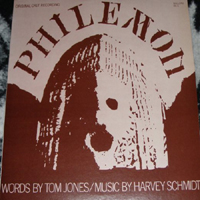 Original Off-Broadway Cast, 1975 (Gallery/no CD)
Original Off-Broadway Cast, 1975 (Gallery/no CD)  (3 / 5) Composer Harvey Schmidt has consistently written lovely, dramatic, and distinctive music. Philemon is the story of Cockian, a street clown in ancient Rome, who is pressured by a Roman commander to impersonate the Christian leader Philemon and who eventually becomes ennobled enough to experience martyrdom. Schmidt’s songs are striking and effective, as are the lyrics of his collaborator, Tom Jones. The opening number, “Within This Empty Space,” establishes the raw theatricality and elements of ritual common to so many Schmidt-Jones shows while also introducing us to Cockian and to the specific, vaguely primitive sound of this score. Jones’ script and lyrics are more complex than usual, and all of the characters are distinctly limned from a musical standpoint. The cast is solid without ever being flashy. It’s headed by Dick Latessa as Cockian; Howard Ross as the Roman Commander; Michael Glenn-Smith as a young prisoner whom Cockian betrays; Kathrin King Segal as Kiki, Cockian’s performing partner; Virginia Gregory as the wife he has abandoned; and Leila Martin as the real Philemon’s wife. If you’re curious, you may be able to track down this long-out-of-print recording, or a tape of the TV version of the musical that featured the original cast. — David Wolf
(3 / 5) Composer Harvey Schmidt has consistently written lovely, dramatic, and distinctive music. Philemon is the story of Cockian, a street clown in ancient Rome, who is pressured by a Roman commander to impersonate the Christian leader Philemon and who eventually becomes ennobled enough to experience martyrdom. Schmidt’s songs are striking and effective, as are the lyrics of his collaborator, Tom Jones. The opening number, “Within This Empty Space,” establishes the raw theatricality and elements of ritual common to so many Schmidt-Jones shows while also introducing us to Cockian and to the specific, vaguely primitive sound of this score. Jones’ script and lyrics are more complex than usual, and all of the characters are distinctly limned from a musical standpoint. The cast is solid without ever being flashy. It’s headed by Dick Latessa as Cockian; Howard Ross as the Roman Commander; Michael Glenn-Smith as a young prisoner whom Cockian betrays; Kathrin King Segal as Kiki, Cockian’s performing partner; Virginia Gregory as the wife he has abandoned; and Leila Martin as the real Philemon’s wife. If you’re curious, you may be able to track down this long-out-of-print recording, or a tape of the TV version of the musical that featured the original cast. — David Wolf
The Phantom of the Opera
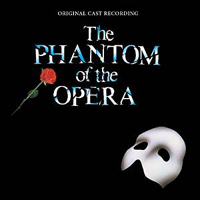 Original London Cast, 1986 (Polydor, 2CDs)
Original London Cast, 1986 (Polydor, 2CDs)  (1 / 5) Andrew Lloyd Webber’s score for this virtually through-sung musical based on the famous novel by Gaston Leroux contains many wonderful melodies; unfortunately, as has been pointed out by sharp-eared critics, some of them are not quite original. Various tunes in The Phantom of the Opera owe much to the work of such composers as Claude Debussy, Giacomo Puccini, and Frederick Loewe. Of the songs that seem to be original, several are pretty but stylistically inappropriate to the time period in which the show is set; for example, “Think of Me,” with its aggressively dotted rhythms. For that matter, the arrangement of the title song makes it sounds like a disco number. Charles Hart’s lyrics (additional lyrics by Richard Stilgoe) range in quality from good to poor. The most successful sections of the score are its lighter moments, particularly the “Notes” / “Prima Donna” sequence. Given the general level of the material, the performance is not bad overall. Michael Crawford is quite compelling as the Phantom; his mannerisms and odd vocal timbre are well suited to a character who’s supposed to be a freakish madman, and with the help of skillful audio engineering, Crawford delivers some spine-tingling high notes. His Christine, Sarah Brightman, sounds fine when singing in the middle of her range at a dynamic level no greater than mezzo forte, but her soprano thins out and become shrill when it rises in pitch and volume, and her vibrato is too heavy for the weight of her voice. Steve Barton sings well as Raoul, especially in the beautiful “All I Ask of You.” The recording gets one grudging star for its few nice moments, but don’t take that as a recommendation to buy it. A final insult: In its initial release, this two-CD set wasn’t tracked, so the only way you could skip to various sections of the score was to press and hold the forward or backward search buttons on your CD player. Reportedly, Lloyd Webber insisted on this, because he had conceived Phantom as a unified, complete work and wanted listeners to experience it as such. (No comment!) — Michael Portantiere
(1 / 5) Andrew Lloyd Webber’s score for this virtually through-sung musical based on the famous novel by Gaston Leroux contains many wonderful melodies; unfortunately, as has been pointed out by sharp-eared critics, some of them are not quite original. Various tunes in The Phantom of the Opera owe much to the work of such composers as Claude Debussy, Giacomo Puccini, and Frederick Loewe. Of the songs that seem to be original, several are pretty but stylistically inappropriate to the time period in which the show is set; for example, “Think of Me,” with its aggressively dotted rhythms. For that matter, the arrangement of the title song makes it sounds like a disco number. Charles Hart’s lyrics (additional lyrics by Richard Stilgoe) range in quality from good to poor. The most successful sections of the score are its lighter moments, particularly the “Notes” / “Prima Donna” sequence. Given the general level of the material, the performance is not bad overall. Michael Crawford is quite compelling as the Phantom; his mannerisms and odd vocal timbre are well suited to a character who’s supposed to be a freakish madman, and with the help of skillful audio engineering, Crawford delivers some spine-tingling high notes. His Christine, Sarah Brightman, sounds fine when singing in the middle of her range at a dynamic level no greater than mezzo forte, but her soprano thins out and become shrill when it rises in pitch and volume, and her vibrato is too heavy for the weight of her voice. Steve Barton sings well as Raoul, especially in the beautiful “All I Ask of You.” The recording gets one grudging star for its few nice moments, but don’t take that as a recommendation to buy it. A final insult: In its initial release, this two-CD set wasn’t tracked, so the only way you could skip to various sections of the score was to press and hold the forward or backward search buttons on your CD player. Reportedly, Lloyd Webber insisted on this, because he had conceived Phantom as a unified, complete work and wanted listeners to experience it as such. (No comment!) — Michael Portantiere
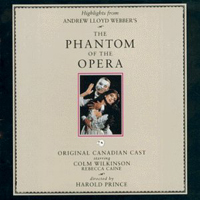 Original Canadian Cast, 1990 (Decca)
Original Canadian Cast, 1990 (Decca)  (1 / 5) As the Phantom on this recording, Colm Wilkinson displays a strong, beautiful, emotionally expressive voice, yet some listeners will find his mannerisms and his Scottish accent intrusive. Also, the broad pseudo-British accents of several other members of the cast are laughably stilted. Rebecca Caine’s soprano is mediocre as heard in Christine’s songs, and her pronunciation is very poor. Byron Nease’s Raoul sounds fine when he’s not overacting and artificially darkening his voice. For some reason, many of the lyrics as set down on this recording are revisions of the originals — but the new versions aren’t superior, just different. This one-disc recording of the score’s “highlights” is a better option for purchase than the two-disc London album because it’s shorter, it’s cheaper, and you don’t have to sift through lots of dross to get to the few songs that are well written and don’t call to mind the melodies of other composers. — M.P.
(1 / 5) As the Phantom on this recording, Colm Wilkinson displays a strong, beautiful, emotionally expressive voice, yet some listeners will find his mannerisms and his Scottish accent intrusive. Also, the broad pseudo-British accents of several other members of the cast are laughably stilted. Rebecca Caine’s soprano is mediocre as heard in Christine’s songs, and her pronunciation is very poor. Byron Nease’s Raoul sounds fine when he’s not overacting and artificially darkening his voice. For some reason, many of the lyrics as set down on this recording are revisions of the originals — but the new versions aren’t superior, just different. This one-disc recording of the score’s “highlights” is a better option for purchase than the two-disc London album because it’s shorter, it’s cheaper, and you don’t have to sift through lots of dross to get to the few songs that are well written and don’t call to mind the melodies of other composers. — M.P.
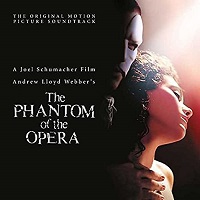 Film Soundtrack, 2004 (Sony)
Film Soundtrack, 2004 (Sony)  (1 / 5) Whatever one’s opinion of The Phantom of the Opera in musical or dramatic terms, its title role offers a golden opportunity for a leading man with a beautiful and distinctive singing voice. So it seems almost perverse that the fellow who was chosen to play the Phantom in the 2004 film version was — Gerard Butler, a Scottish stage and film actor who had no previous musical experience other than having sung in a rock band as a young man, and whose voice, as it eventually became clear to anyone who saw the film and/or heard the soundtrack recording, was not up to the demands of pop-opera arias like “Music of the Night.” In the role of Christine, Emmy Rossum displays a soprano that’s very pretty, if rather thin, and at least her singing isn’t plagued by that awful, quivering, Sarah Brightman vibrato. The best vocalist among the three major leads is Patrick Wilson as Raoul, though his all-American accent in both his songs and the dialogue included on the recording is distracting in context, making him sound like a fish out of water. Minnie Driver’s singing as Carlotta was dubbed by opera singer Margaret Preece, who does a fine job with “Prima Donna” and her other vocal moments — and, in recorded dialogue, we do get to hear the amusingly over-the-top Italian accent Driver developed for the role. As might be expected, the large orchestra hired to record the film soundtrack sounds wonderful playing lush orchestrations crafted along the lines of the stage originals. Like the Canadian cast recording reviewed above, the soundtrack album contains one disc’s worth of highlights, so if you want to hear more of the Phantom score as heard in the movie, you’ll have to buy or rent it on video. — M.P.
(1 / 5) Whatever one’s opinion of The Phantom of the Opera in musical or dramatic terms, its title role offers a golden opportunity for a leading man with a beautiful and distinctive singing voice. So it seems almost perverse that the fellow who was chosen to play the Phantom in the 2004 film version was — Gerard Butler, a Scottish stage and film actor who had no previous musical experience other than having sung in a rock band as a young man, and whose voice, as it eventually became clear to anyone who saw the film and/or heard the soundtrack recording, was not up to the demands of pop-opera arias like “Music of the Night.” In the role of Christine, Emmy Rossum displays a soprano that’s very pretty, if rather thin, and at least her singing isn’t plagued by that awful, quivering, Sarah Brightman vibrato. The best vocalist among the three major leads is Patrick Wilson as Raoul, though his all-American accent in both his songs and the dialogue included on the recording is distracting in context, making him sound like a fish out of water. Minnie Driver’s singing as Carlotta was dubbed by opera singer Margaret Preece, who does a fine job with “Prima Donna” and her other vocal moments — and, in recorded dialogue, we do get to hear the amusingly over-the-top Italian accent Driver developed for the role. As might be expected, the large orchestra hired to record the film soundtrack sounds wonderful playing lush orchestrations crafted along the lines of the stage originals. Like the Canadian cast recording reviewed above, the soundtrack album contains one disc’s worth of highlights, so if you want to hear more of the Phantom score as heard in the movie, you’ll have to buy or rent it on video. — M.P.
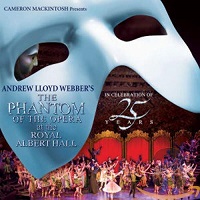 Royal Albert Hall – 25th Anniversary Cast, 2011 (Decca Broadway, 2CDs)
Royal Albert Hall – 25th Anniversary Cast, 2011 (Decca Broadway, 2CDs)  (2 / 5) This live recording of a fully-staged presentation of Phantom at London’s Royal Albert Hall in celebration of the show’s 25th anniversary stars Ramin Karimloo, an Iranian/Canadian singer-actor who has become a major presence on the London and New York stages in recent years, and Sierra Boggess, the American musical theater star who originated the title role in The Little Mermaid on Broadway and who would go on to play the female lead in Andrew Lloyd Webber’s School of Rock. Both are extraordinarily gifted from a vocal standpoint — his strong, exciting bari-tenor has plenty of “ping,” her soprano is creamy and sumptuous, with no flutter — and are therefore a pleasure to hear in this music, if you like the score to begin with. Hadley Fraser sounds virile, romantic, and very appealing as Raoul. The performance, also available on video, features a cast and orchestra of more than 200, with special guest appearances by Michael Crawford and Sarah Brightman, plus Colm Wilkinson, Anthony Warlow (who played the title role in the Australian production), Peter Jöback (who has starred as the Phantom in the West End, on Broadway, and in Sweden), and John Owen Jones (from the London and 25th anniversary tour productions). It’s all quite lavish and over-the-top, very much in keeping with the general tone of a modern-day poperetta that has become a worldwide phenomenon. — M.P.
(2 / 5) This live recording of a fully-staged presentation of Phantom at London’s Royal Albert Hall in celebration of the show’s 25th anniversary stars Ramin Karimloo, an Iranian/Canadian singer-actor who has become a major presence on the London and New York stages in recent years, and Sierra Boggess, the American musical theater star who originated the title role in The Little Mermaid on Broadway and who would go on to play the female lead in Andrew Lloyd Webber’s School of Rock. Both are extraordinarily gifted from a vocal standpoint — his strong, exciting bari-tenor has plenty of “ping,” her soprano is creamy and sumptuous, with no flutter — and are therefore a pleasure to hear in this music, if you like the score to begin with. Hadley Fraser sounds virile, romantic, and very appealing as Raoul. The performance, also available on video, features a cast and orchestra of more than 200, with special guest appearances by Michael Crawford and Sarah Brightman, plus Colm Wilkinson, Anthony Warlow (who played the title role in the Australian production), Peter Jöback (who has starred as the Phantom in the West End, on Broadway, and in Sweden), and John Owen Jones (from the London and 25th anniversary tour productions). It’s all quite lavish and over-the-top, very much in keeping with the general tone of a modern-day poperetta that has become a worldwide phenomenon. — M.P.
Phantom
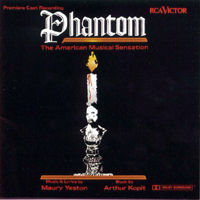 Studio Cast, 1993 (RCA)
Studio Cast, 1993 (RCA)  (4 / 5) Unfortunately, Maury Yeston (music and lyrics) and Arthur Kopit (book) began work on their own adaptation of the Gaston Leroux potboiler The Phantom of the Opera concurrently with the Andrew Lloyd Webber version, but Loyd Webber got his to the stage first; so this Phantom, with just as lush music and vastly superior lyrics, has never gotten any closer to Broadway than New Jersey. The whole sordid mess is recounted by Kopit in his notes for this recording, very well produced by Yeston, Steve Vining, and Bill Rosenfield. Yeston’s wide-ranging score roams from the Gothic breast beating of “Paris Is a Tomb” to the lilt of “Melodie de Paris” to the foxtrot “Who Could Ever Have Dreamed Up You?” The sturdy Richard White, in the title role, doesn’t really get to show his stuff till the revelatory 11-o’clock number, “My Mother Bore Me”; but he gives that song the full treatment, going vocally and histrionically to the top, yet not over it. Glory Crampton, as Christine, sounds sweet but thin in her upper range. On the other hand, it’s a pleasure to have the underemployed Meg Bussert as Carlotta, deliberately screeching her way through “As You Would Love Paree” and having lots of hammy fun with “This Place Is Mine.” Jack Dabdoub and Paul Schoeffler are helpful in supporting roles, and Jonathan Tunick’s orchestrations and conducting are, as usual, superb. Best of all, it’s refreshing to hear a Phantom that is musically satisfying and not lyrically pinheaded. — Marc Miller
(4 / 5) Unfortunately, Maury Yeston (music and lyrics) and Arthur Kopit (book) began work on their own adaptation of the Gaston Leroux potboiler The Phantom of the Opera concurrently with the Andrew Lloyd Webber version, but Loyd Webber got his to the stage first; so this Phantom, with just as lush music and vastly superior lyrics, has never gotten any closer to Broadway than New Jersey. The whole sordid mess is recounted by Kopit in his notes for this recording, very well produced by Yeston, Steve Vining, and Bill Rosenfield. Yeston’s wide-ranging score roams from the Gothic breast beating of “Paris Is a Tomb” to the lilt of “Melodie de Paris” to the foxtrot “Who Could Ever Have Dreamed Up You?” The sturdy Richard White, in the title role, doesn’t really get to show his stuff till the revelatory 11-o’clock number, “My Mother Bore Me”; but he gives that song the full treatment, going vocally and histrionically to the top, yet not over it. Glory Crampton, as Christine, sounds sweet but thin in her upper range. On the other hand, it’s a pleasure to have the underemployed Meg Bussert as Carlotta, deliberately screeching her way through “As You Would Love Paree” and having lots of hammy fun with “This Place Is Mine.” Jack Dabdoub and Paul Schoeffler are helpful in supporting roles, and Jonathan Tunick’s orchestrations and conducting are, as usual, superb. Best of all, it’s refreshing to hear a Phantom that is musically satisfying and not lyrically pinheaded. — Marc Miller

